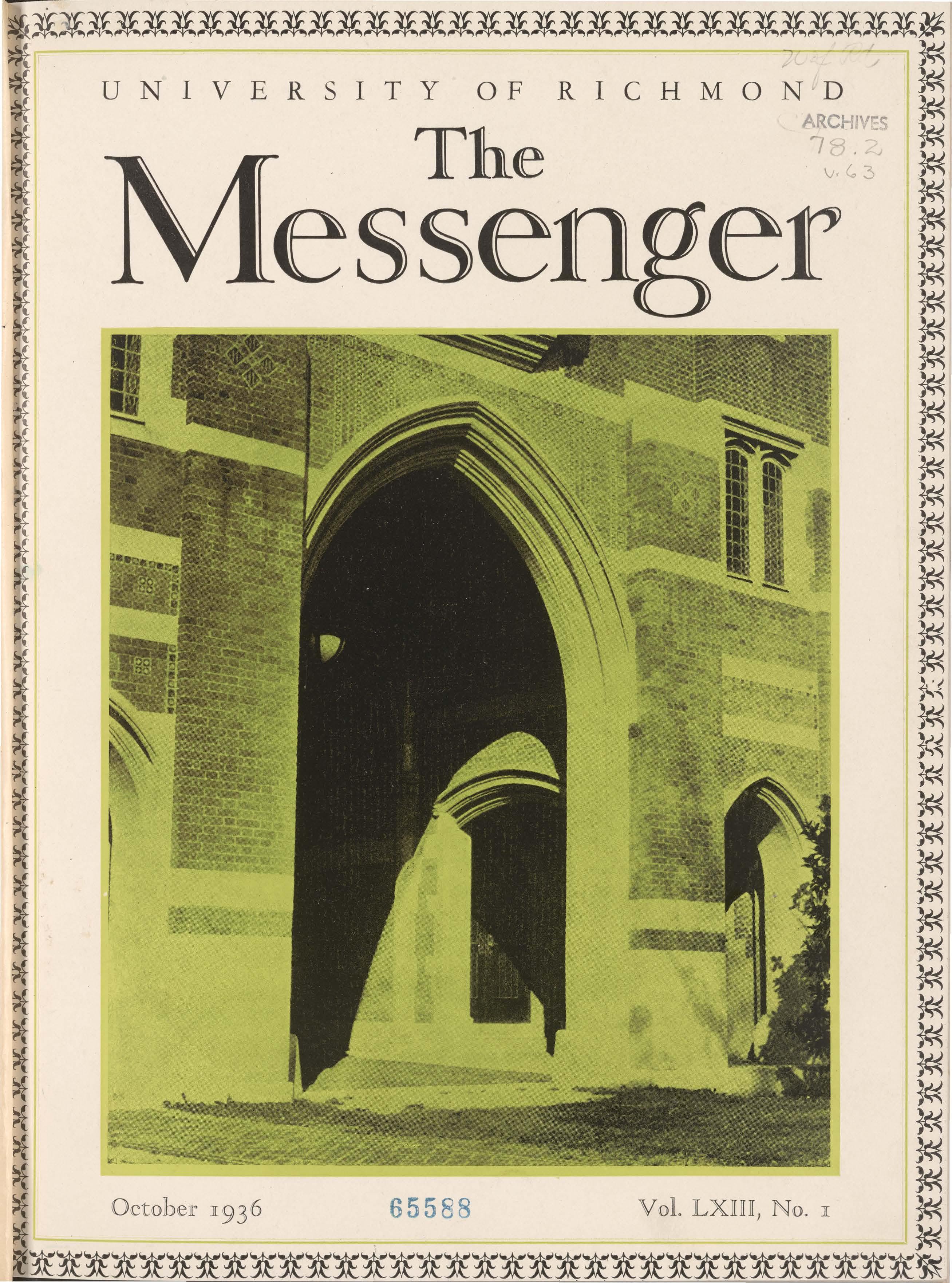
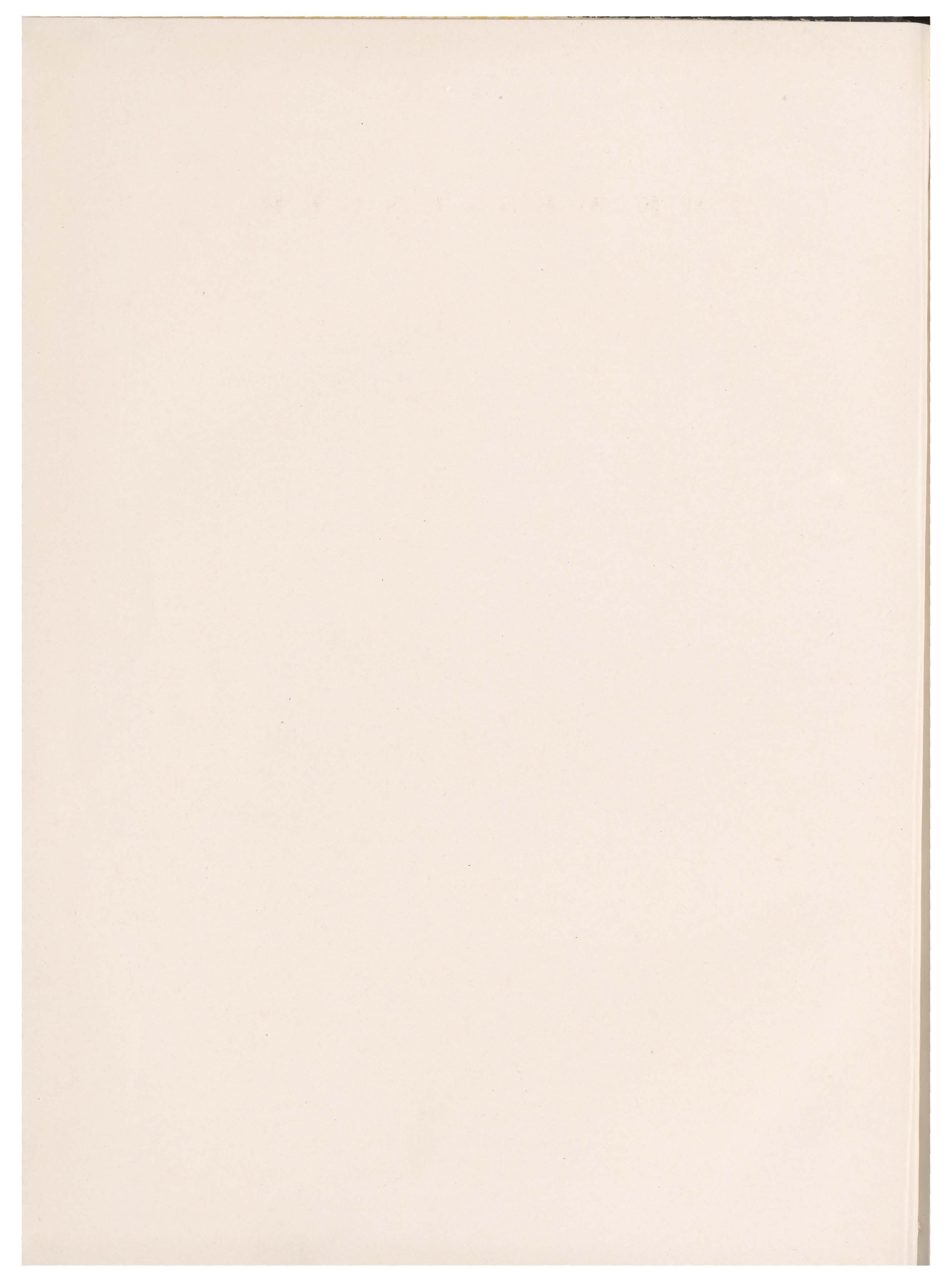
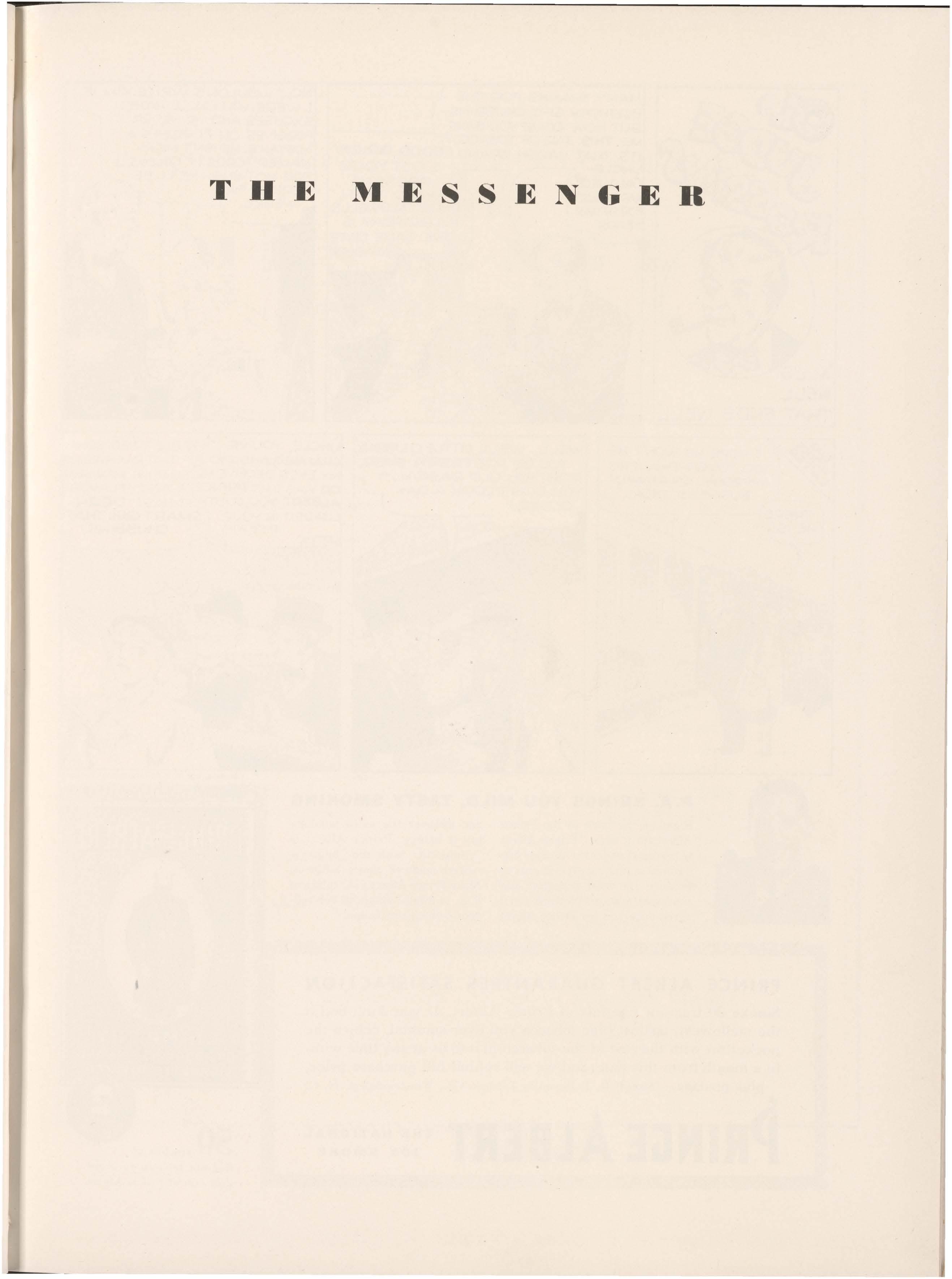




MANY "THANKS FOR ""THE BIR"THDAY GIFT, CHUBBINSBUT HOW COME YOU GAVE ME 'THIS JAR OF TOBACCO'? _J-.----------1 11'15 "THAT HARSH BRAND GOOD GRIEF/ UNCLE __ __,, I GOT YOU~ CALDWELL PRESE"1T 1-1ASSMOKGD MIXED WITH FORFIFTEEIJ UNCLE CALDWELL$. YEARS HIS BIRTI-IDA'y' IS 1HE SAME DA"TE ASYOURS!
NO,l WOULDNT WRl"TE 1-Hl'vl,IF I WERE YOU. UNCLE I-IA"TES EXCUSES AND HE NEVER FORGIVES OR FORGETS A MISTAKE. HE ISN'T NICKNAMED 'CRUSTY 1 CALDWE FOR NOTHING - HE'LL RE I , \':,

ALL'S WELL THAT ENDS WELL
LE, 'y'QU'V I I-IOPE I-IE WO 0 "TOU61-1-l W PROVAL ONA SINESS
NGEqAND 1"1--lATP.A.CI-IUBBI EYES DECEI ENT ME. MA~,W WAS 'THAT P "TASTY FLAVO ERT YOU HAS! DER ED IN YO ART G\RL,7'H CHUBBIN
Right on the back of the Prince Albert tin it says: "Prince Albert is prepared under the process discovered in making experime nts to produce the most delightful and wholesome tobacco." We think you'll agree once you try Prince Albert and discover the extra smoking joy it brings. Prince Albert is "crimp cut," with the "b it e" removed, made of choice tobaccos. Make Prince Albert your tobacco! P.A. is swell "makin's" for rollyour-own cigarettes too.
Smoke 20 fragrant pipefuls of Prince Albert. If you don't find it the mellowest, tastiest pipe tobacco you ever smoked, return the pocket tin with the rest of the tobacco in it to us at any time within a month from this date, and we will refund full purchase price,
sopipefuls of fragrant tobacco in every 2-oz. tin of Prince Albert
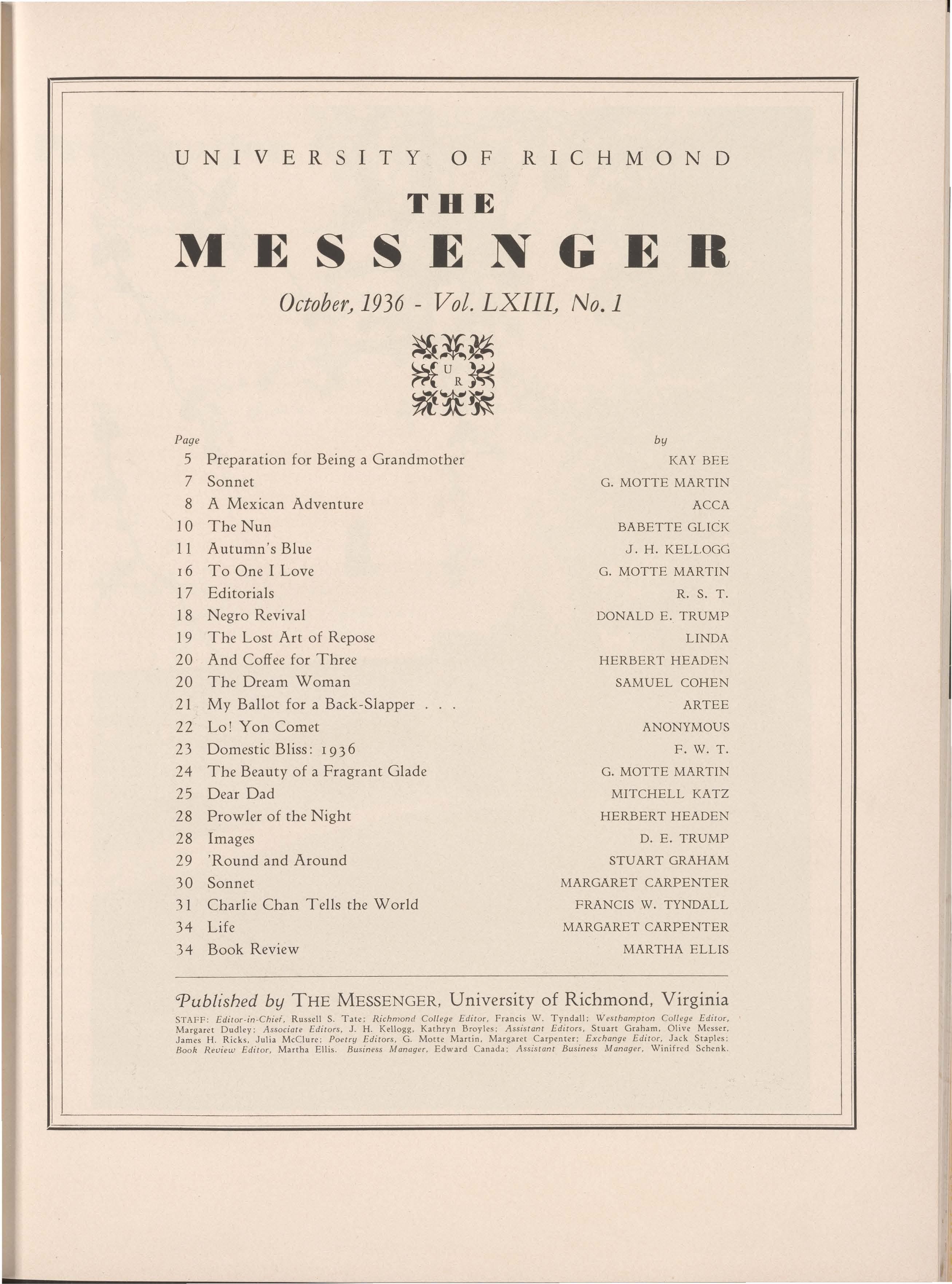

by KAY BEE
BEING a conventional person, I naturally have a superfluity of relatives, ranging from Confederate veterans to the gurgling offspring of my first cousins. We need not concern ourselves with the latter. They are still innocent of the fault I have in mind, and which everybody older than I am seems to possess. That is the smug habit of expressing their superiority by inserting reminiscences into every lull in the conversation. Why in the name of Heaven should a repertoire of ''I remember whens'' entitle one to open-mouth admiration and respect? It will probably remain one of life's imponderables to me,-just like that irresistible forceand-immovable- object problem. Unfortunately, a person who is conventional enough to have a million relatives is also conventional enough to have the habit of imitative conformity. Rather than preserve a discreet silence when I'm old, I know I, too, shall rack my brain for memories with which to regale the younger generation. I'll have my revenge for the hours I've politely listened to the tales of the Buggy era and the Mauve Decade. I must confess I've started already. ,
Among the army of kin, there's a great aunt who usually spends the night with us on her way from one child's home to another. Usually I am delegated to meet her at the station, and invariably, as we pass the Lee Monument, she placidly begins the story of its unveiling. I admit that the first time I was told the story, it gave me quite a thrill, but now I merely assume a politely interested mien and wish I'd remembered to drive up Broad Street instead. To add to my irritation, the versions are now rather garbled. The first time I heard it, the statue surveyed a waving field of grain, but now modern . 5
rotation of crops has placed tobacco there. There is also something about a group of school girls who patriotically became dray horses for the o:::casion and dragged the statue through the streets to its place of permanent abode. The unveiling was further enlivened by the flag's catching on the
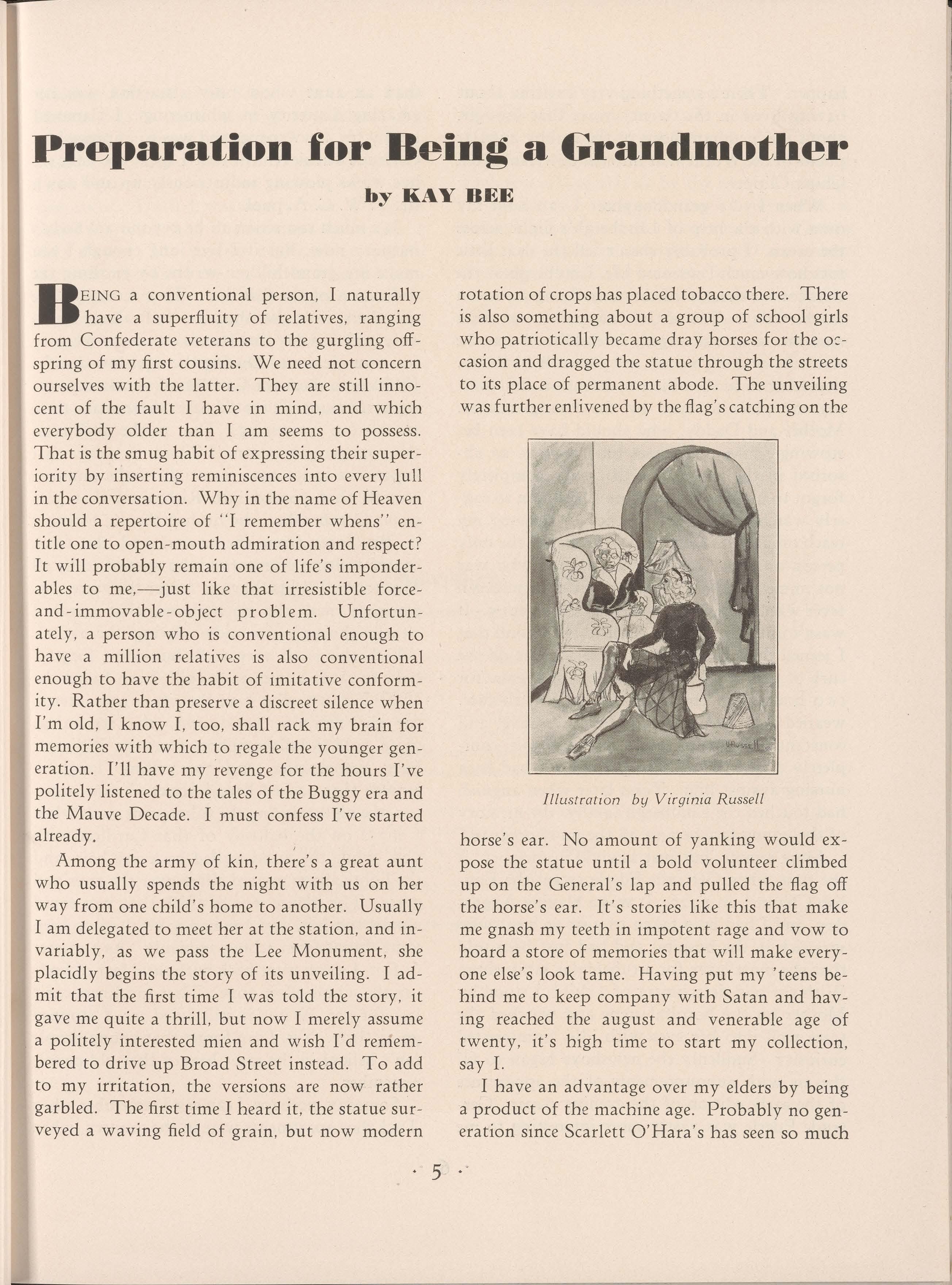
horse's ear. No amount of yanking would expose the statue until a bold volunteer climbed up on the General's lap and pulled the flag off the horse's ear. It's stories like this that make
me gnash my teeth in impotent rage and vow to hoard a store of memories that will make everyone else's look tame. Having put my 'teens behind me to keep company with Satan and having reached the august and venerable age of twenty, it's high time to start my collection, say I.
I have an advantage over my elders by being a product of the machine age. Probably no generation since Scarlett O'Hara' s has seen so much
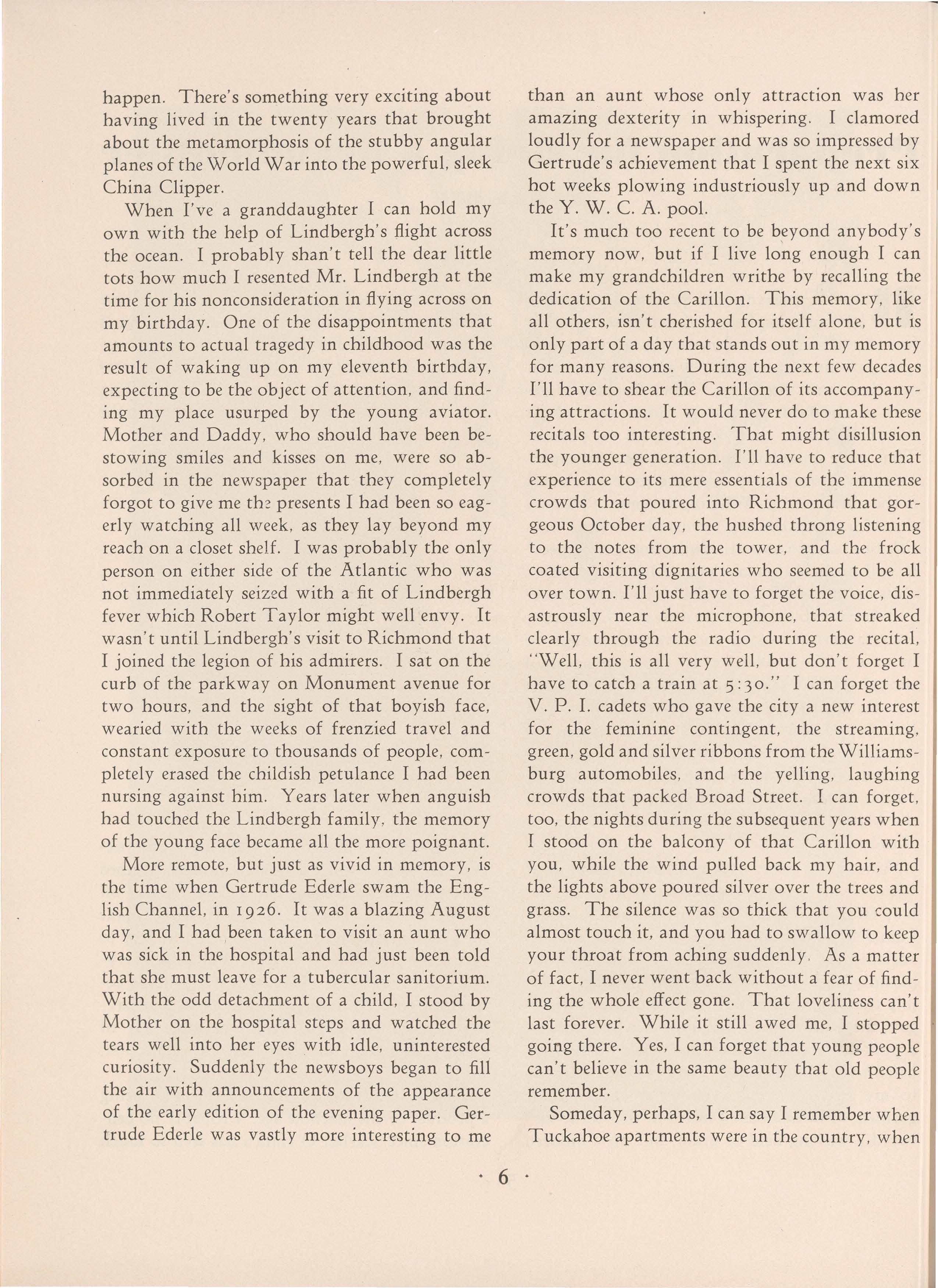
happen. There's something very exciting about having lived in the twenty years that brought about the metamorphosis of the stubby angular planes of the W odd War into the powerful, sleek China Clipper.
When I've a granddaughter I can hold my own with the help of Lindbergh's flight across the ocean. I probably shan't tell the dear little tots how much I resented Mr. Lindbergh at the time for his nonconsideration in flying across on my birthday. One of the disappointments that amounts to actual tragedy in childhood was the result of waking up on my eleventh birthday, expecting to be the object of attention, and finding my place usurped by the young aviator. Mother and Daddy , who should have been bestowing smiles and kisses on me, were so absorbed in the newspaper that they completely forgot to give me th? presents I had been so eagerly watching all week, as they lay beyond my reach on a closet shelf. I was probably the only person on either side of the Atlantic who was not immediately seized with a fit of Lindbergh fever which Robert Taylor might well envy. It wasn ' t until Lindbergh's visit to Richmond that I joined the legion of his admirers. I sat on the curb of the parkway on Monument avenue for two hours , and the sight of that boyish face, wearied with the weeks of frenzied travel and constant exposure to thousands of people , complete! y erased the childish petulance I had been nursing against him. Years later when anguish had touched the Lindbergh family , the memory of the young face became all the more poignant.
More remote , but just as vivid in memory , is the time when Gertrude Ederle swam the English Channel, in I 9 2 6. It was a blazing August day , and I had ,been taken to visit an aunt who was sick in the hospital and had just been told that she must leave for a tubercular sanitorium. With the odd detachment of a child , I stood by Mother on the hospital steps and watched the tears well into her eyes with idle , uninterested curiosity. Suddenly the newsboys began to fill the air with announcements of the appearance of the early edition of the evening paper Gertrude Ederle was vastly more interesting to me
than an aunt whose only attraction was her amazing dexterity in whispering I clamored loudly for a newspaper and was so impressed by Gertrude's achievement that I spent the next six hot weeks plowing industriously up and down the Y . W . C . A . pool.
It's much too recent to be b~yond anybody ' s memory now , but if I live long enough I can make my grandchildren writhe by recalling the dedication of the Carillon. This memory , like all others , isn't cherished for itself alone , but is only part of a day that stands out in my memory for many reasons During the next few decades I'll have to shear the Carillon of its accompanying attractions . It would never do to make these recitals too interesting. That might disillusion the younger generation. I'll have to reduce that experience to its mere essentials of the immense crowds that poured into Richmond that gorgeous October day , the hushed throng listening to the notes from the tower , and th e frock coated visiting dignitaries who seemed to be all over town. I'll just have to forget the voice, disastrously near the microphone , that streaked clearly through the radio during the recital, " Well, this is all very well , but don ' t forget I have to catch a train at 5 : 3 o ." I can forget the V. P. I. cadets who gave the city a new interest for the feminine contingent, the streaming , green , gold and silver ribbons from the Williamsburg automobiles , and the yelling , laughing crowds that pack ed Broad Street. I can forget , too , the nights during the subsequent years when I stood on the balcony of that Carillon with you, while the wind pulled back my hair , and the lights above poured silver over the trees and grass. The silence was so thick that you could almost touch it, and you had to swallow to keep your throat from aching suddenly , As a matter of fact , I never went back without a fear of finding the whole effect gone That loveliness can ' t last forever. While it still awed me , I stopped going there Yes, I can forget that young p eople can ' t believe in the same beauty that old p eople remember.
Someday, perhaps , I can say I remember wh en Tuckahoe apartments were in the country , when
.
Thomas Jefferson High School was clean, when Maude Adams made her first appearance, and when the Mosque had movies. If I can persuade them to listen long enough, I can tell the children about the first time I ever saw snow. Until I was nearly four I lived in South Carolina, and during those four years it didn't snow. My parents neglected to explain the phenomenon to me, or maybe I hadn't been listening. Anyway, the first night I came to Richmond, it had what still seems to me the most wonderful snow storm I ever saw. I firmly believe snow ought to be kept a secret from everybody until they're four, and then spring a bangup snowstorm. They'll never have that big a
thrill again. I've never recovered fully from it. I simply can't understand why some people regard it as a nuisance and grumble every time a flake falls. If I had my way, everybody would drop everything and sit by the window gaping. To be sure, my collection of memories is rather meagre as yet, but give me time. There's only one experience I wish I could remember. Nothing would have given me more amusement than the confusion which attended my rather abrupt arrival. In the excitement that ensued the most convenient place to deposit me happened to be a shoe box, and it was just the right size. That would be such fun, if I could only remember it.

by G. MOTTE MARTIN
The fire unfurled the tawny flag of Hell, Aglow with Heaven's stolen rays of light, And licked the soot, the frost of Hell's red night, Above the molten glow of coals that fell. I fought, with sleepy eyes, the sullen spell That Fancy spun, was winning slow the fight, When Poetry's flaming demon flared in sight
And drew my writhing soul from out its shell. At first I fought the twanging spirit bow But when I found my thoughts so free to fly. In gratitude I thanked this fiendish foe Who pained but shot new pleasures blazing by. For Beauty lingers long in Poetry's glow And is, save Love, the greatest joy I know.

by ACCA
SMOKE oozed forth into my face as I shoved open the loosely swung door of the Cochinillo Bar in the little fishing village of Puercodito. Inside the lamps worked overtime trying to throw their irresolute yellow gleam through the haze so that the few sober patrons might the better see to push their way about the floor to the din of a one-roll player piano.
A fat, squalid man waddled up and announced, "I have nice beer--dos peniques. Maybe you like ladee-un peso, si?"
"No, thanks. Just a beer for right now."
"Si. Pronto, senor." With that usual geniality which the usual Mexican proprietor shows for American gold, he ushered me to a table near the piano. I knew his method. I was expected to waste good American nickles on a piano which plunked out only "The St. Louis Blues." There is going to be some objection to the fact that the place had a player piano and no electric lights. The catch is that the piano was operated by a gasoline motor.
The service was prompt, but God help the beer. That enterprising Yankee who stuck the Mexican with the piano could have done humanity a ,great service by selling the man a gasoline refrigerator instead. The proprietor would have been out in either case, for Mexicans just don't know the taste of cold beer. Only those who have been above the Rio Grande know the glory of a cool drink other than that of spring water.
It was when the music ceased that I heard a tap-tap behind me. Someone must have been keeping time to the music and had forgotten to stop. When the noise continued unabated, I turned to find myself in the line of fire of a wicked-looking 3 8 revolver. My gaze shifted from the muzzle to the bleary eyes of a drunken
American. Immediately he saw me, he stopped the silly sound and lurched to his feet. Wabbling from side to side, he came over to my table and seated himself across from me.
"Yuh know me?" he asked.
"Can't say I do," I replied.
"My name's Macy. Pleashed to meet yuh, Jones."
"Pardon me, but my name is not Jones. It's Smith."
"Smart guy, eh? I know that yoh're down here to take me home. Yuh can't fool me.''
This to me was quite amusing and interesting as my name was neither Jones nor Smith and as I had no idea then of taking anyone home with me in my small boat.
The drunk mumbled something else between his unshaven lips. "I can't face 'em." He toyed with the revolver. I reached out my hand and disengaged it from his grasp. Suicide was paramount in his mind, and I wanted to hear his story before he did anything drastic.
I called the proprietor and ordered two tomatoes which I made the stranger eat. Slightly sober, he agreed to come aboard my boat and spend the night.
* * * *
Early the next morning I tacked out of the harbor with a stiff West wind filling my sails, and below deck my passenger slept the sleep of the inebriate.
It was around seven bells ( eleven-thirty o'clock) before my passenger stuck his tousled head above deck and asked for water. I lashed the wheel and tumbled below to get him a snack to eat.
By the time he had downed his breakfast, Macy was fully awake. "What's the idea," he wanted to know, "of taking me away like this
without my permission? I don't ever want to see the States again."
I led him above and convinced him with the aid of the compass that we were not heading to the North. He seemed rather satisfied, and I had high hopes of getting the story of his being stranded in a little inaccessible village.
But I was not to be satisfied till three days later when we were becalmed in a torrid sea.
We were on deck under the forward awning, when without any introduction, Macy started his story.
"You have, I know, been exceedingly curious to ,know all about me. Your profession calls for unusual plots, and I believe I have an unusual one here.
"About six months ago, a Mexican came into the insurance office in which I work, and he asked for a very large policy. He wanted a $ r 00,000 policy with a double indemnity for death by accident. His name according to his questionnaire was Pedro Imanuel, dealer in Mexican Curios. After the usual delay for investigation, he got his policy duly signed.
"For three months the company received the payments, but on the day of the fourth month when the payment was due, a letter was received instead. Pedro Imanuel had met his death by accident.
"My job being that of Special Investigator, I was immediately dispatched to New Orleans to interview the various witnesses attendant at the death of our insured.
''The witnesses-all Mexican-told the same story. The sea had been high all through the passage from Mexico, and most of the passengers had gathered on deck to lean over the rail. They were in this position when Pedro rushed on deck with his hand clapped over his mouth. As he leaned over the rail to empty the contents of his stomach, the rail suddenly collapsed and
he hurtled into the angry sea. The ship put about, but his body was not recovered.
"I had made up my mind that the accident was true and was about to wire my company the details, when I came across the fact that the steamship company was owned by relatives of Imanuel. An accident would therefore be very easy to fake with the witnesses carefully primed as to what to say.
"So I continued my investigation along the line that the whole thing was a fraud, until at last one lucky day, my path crossed the trail of Pedro. He had taken a boat back to Mexico where he expected to wait for the whole thing to blow over. All in all it was a very clever plot.
"From port to port, town to town, village to village, I stuck behind him, sometimes one day off, others two or three. Finally I found that I had him cornered in a little hut in the mountains.
"I hired an Indian guide who led me over the tortuous route to the cabin. We arrived there late in the afternoon. Striding up to the door, we flung it open. Pedro was bending over the fire cooking his meal.
" 'Well?' he said. 'What do you want?' He had never seen me before, and it is doubtful if he knew that he had been followed.
" 'I have come,' I said, 'to take you to the States to face trial for an attempt to defraud the insurance company.'
"It was then that the fireworks started. He charged at us with a chair. I had given the guide careful instructions not to kill the man if he found it necessary to shoot.
"My guide was no exception to the general rule that Mexican Indians are unreliable in an emergency. When he shot, he shot to kill. and he did. $200,000 of the company's money settled down on the floor with a neat little hole in its head.
"And that, my friend, is why I don't want to go back to New York."

. 9 .
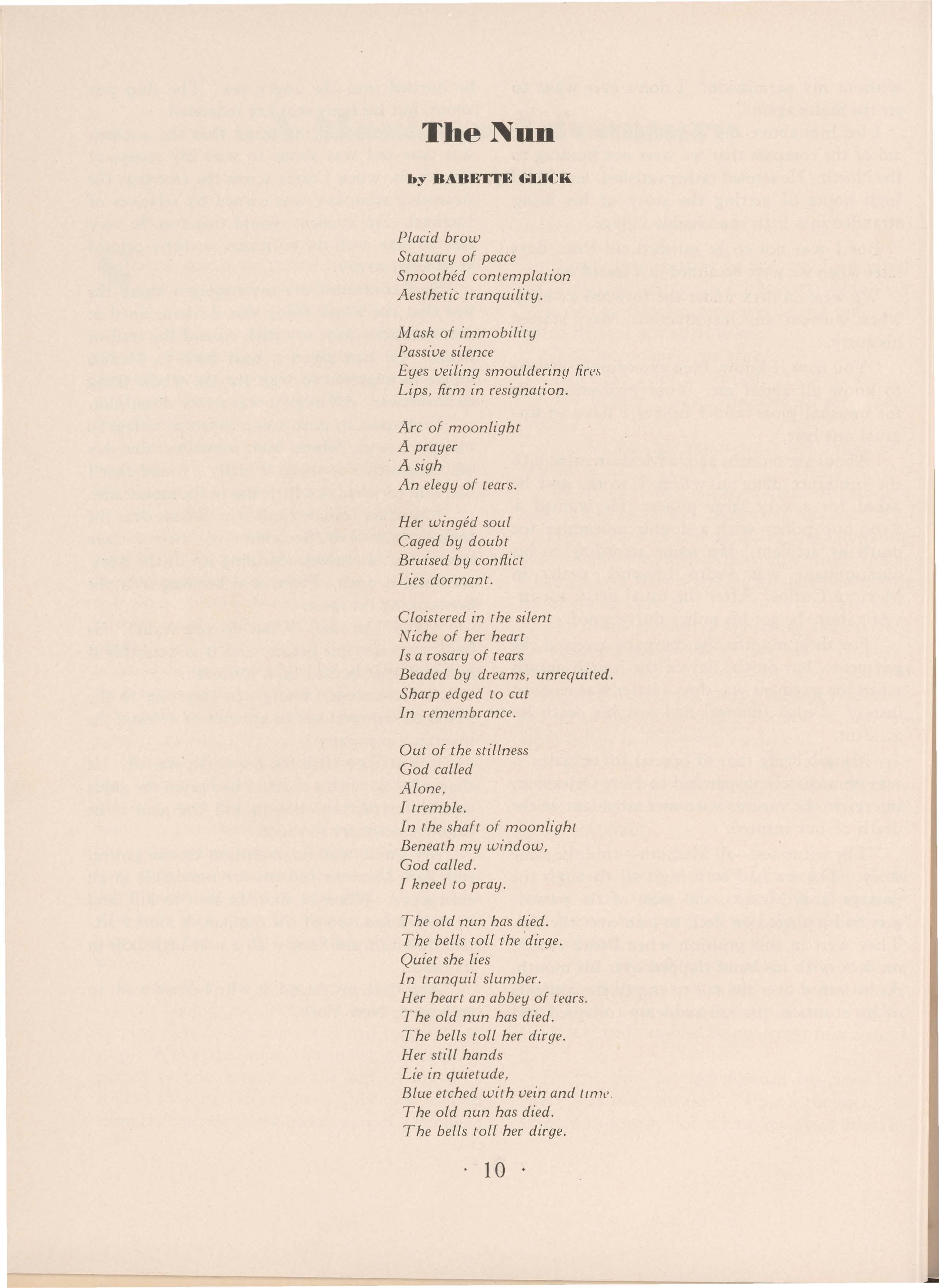
by BABETTE GI,ICK
Placid brow
Statuary of peace
Smoothed contemplation
Aesthetic tranquility
Mask of immobility
Passiue silence
Eyes ueiling smouldering fire,, Lips , firm in resignation.
Arc of moonlight
A prayer
A sigh
An elegy of tears.
Her winged soul
Caged by doubt
Bruised by conflict
Lies dormant.
Cloistered in the silent Niche of her heart
Is a rosary of tears
Beaded by dr eams , unrequited.
Sharp edged to cut
In remembrance.
Out of the stillness
God called Alone , I tremble.
In the shaft of moonlight
Beneath my window, God called I kneel to pray.
The old nun has died.
The bells toll the 'dirge.
Quiet she lies
In tranquil slumber.
Her heart an abbey of tears.
The old nun has died.
The bells toll her dirge.
Her still hands
Lie in quietude ,
Blue etched with uein and ltme
The old nun has died.
The bells toll her dirge.
·
by J. D. KELLOGG
Two boys and a girl sat around a breakfastroom table, drinking. The girl and the boy sitting near her were drinking gin cocktails and the other boy was drinking straight whiskey and chasing it with water. The girl emptied her glass and set it on the table.
"Ready for another one?" The boy who was drinking the whiskey got up and took her glass.
"No thanks. But I'll take a cigarette please."
He gave her one and lit it and leaned back in his chair and picked up a partly-filled whiskey glass. " You don't like gin, do you Helen?"
"It's all right. Anything's better than that raw whiskey you're drinking."
" It's not raw. You and Jack just can't take it."
Jack set his glass down and lit a cigarette. "There he goes! Can't take it. Ugh!"
" Billy, I'm afraid you're a whiskey head." Helen shook her finger mockingly at him.
" Oh no. Gin just makes me si,k."
"Oh."
Helen and Jack sat on one side of the table together. Billy sat a~ross from them, with his chair tilted against the wall. Jack held one of Helen's hands in his and listened to her and Billy talk.
" Where's your mother, Billy?" Helen asked.
"Upstairs reading."
'' She won't mind our sitting down here drinking?"
He made a deprecating gesture. "You two ready for another?"
Helen shook her head. Jack extended his glass. Billy took it and went through the swinging door into the kitchen. Jack took his hand from Helen's and put his arm around her. She turned toward him.
"How much more :ire you going to drink, Jack?"
"Not much. Why?"
"I just don't want you to get tight, that's all."
'Tm not going to get tight. And I'm not tight now!"
"I know you' re not. And don't scream!"
"I wasn't screaming." He flipped ashes from his cigarette on the floor and turned to her. ''You do love me, don't you?''

She looked toward the kitchen door and then back at him. "What do you think?"
Jack frowned and turned his head.
"You know I do." Helen caught his drooping hand in hers.
"Yes. I know. But what are we going to do about it?"
" 'Do about it?' "
"I just mean what's the use?"
"Please, Jack! Do we have to go through all that again?"
He shook his head. "No, I guess not."
'' Please!'' She leaned over and kissed him.
Billy pushed the door open with his foot and entered, carrying a plate with ,cheese and crackers and a pitcher of water. Helen drew aw3y from Jack quickly.

Billy smiled. "Don't mind me. I'm just a pal."
Helen patted her hair.
"Don't blush so."
'Tm not blushing," she said, blushing more.
Jack glared at Billy.
'Tm sorry." He went into the kitchen and came back with a drink for Jack and poured himself a drink from the bottle on the table. "Come on, let's get jovial."
Jack stared moodily at a calendar on the wall. 'Tm willing "
" You don't sound it. "
' 'I've got the jitters "
"Well!" said Helen. "Maybe you'd better take me home. ' '
Jack reached for her hand. " Don't be silly."
" What's the matter , Jackie boy? You and Helen had a fight ? ''
" No. Maybe we should."
"And why?" Helen arched her eyebrows and made a face.
Jack sipped his drink. " I don't know."
"I believe he's getting blotto, Helen."
Jack grunted. "You ought to leave that collegiate vernacular upstairs with your bed-room slippers.''
"Rawther."
' ' Nuts.''
Billy got up and turned on the radio. He got some dance music and made the volume low.
" What's the matter with us tonight?" he said , sitting down again .
" Is there anything? " Helen ,stood up and brushed cigarette ashes from her dress
" Must be. We're not very happy."
"Aren ' t we?" Jack tilted his chair back and smiled cynically.
Helen frowned. " What's the matter, Jack? Are you griped again? " She sat down with a sigh
" 'Again? ' Wh en was I? "
" I don't know. But you seem so-well , skip it. "
" I know. I guess I am pretty gummy tonight, b-1a t I don't feel very well."
" You ' ve been like this for a couple of days."
' Tm blue, I guess. "
" Why?" said Billy. " Helen and I must be dull company.''
''I wish I knew. I get like this every fall. Some sort of melancholy , I suppose."
"Well, I didn't know you last fall, so I can't judge. What about it, Billy?" Helen looked to Billy.
"Yeah. Around the first of every October he gets kind of screwy."
"And you're getting tight to forget it?" she said to Jack.
'Tm not getting tight. And if I were , ,it wouldn't be to forget anything. That doesn't work."
Billy grinned. " It usually works with m e."
" With me it just postpones remembering And then it's twice as bad If I were getting tight , it would be just for the hell of it But I'm not." He emptied his glass. " Fix me another drink , will you?"
Billy took his glass and went into the kitchen. Jack turned to Helen and smiled weakly. "Don't mind me. I'll be all right tomorrow " He ruffled her hair.
They sat in silence , Jack smoking and drumming with his fingers on the table Helen straightened her .hair.
"This gin buck will fix you right up , my boy," Billy said, returning.
" I expect that's nearer correct than you know . "
" I saw Nancy Stanton today ," Helen said , after a pause.
Billy looked up " You did? She got married last week , didn ' t she ? ' '
" As if you didn ' t know ," Jack said
"Oh well, I'd heard it. "
"Huh ! You probably know every move she's made in the last two years."
"I haven't known her but a year and a half ."
"Don't be coy. A year and a half then ."
"Whatever happened to you and Nancy , Billy?" Helen asked .
" Oh , nothing Excuse me a minute. I'm going to turn off the light in the kitchen."
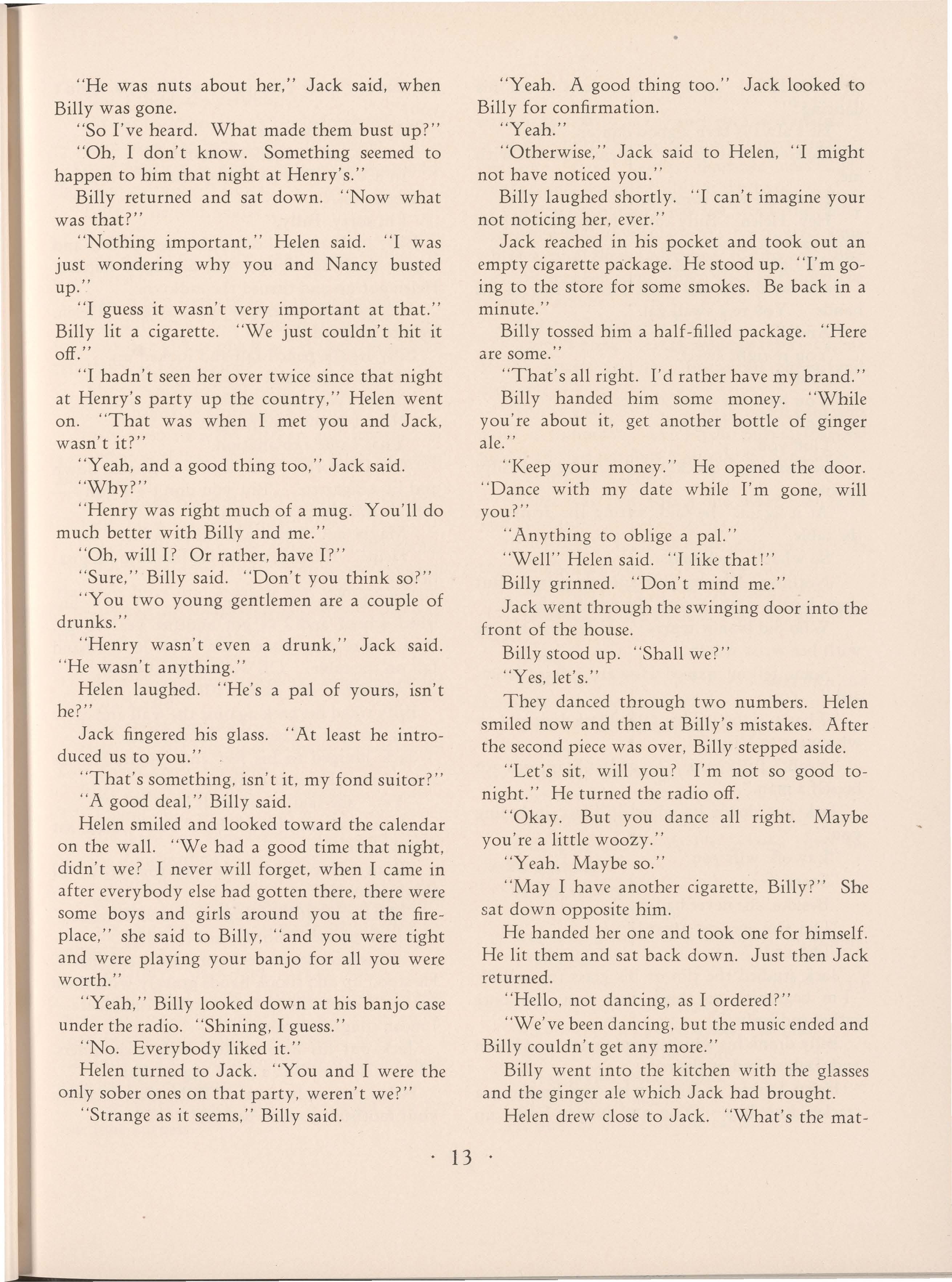
" He was nuts about her," Jack said, when Billy was gone.
" So I've heard . What made them bust up? "
" Oh , I don ' t know. Something seemed to happen to him that night at Henry ' s. "
Billy returned and sat down. " Now what was that?"
" Nothing important ," Helen said " I was just wondering why you and Nancy busted up ."
" I guess it wasn't very important at that. " Billy lit a cigarette " We just couldn ' t hit it off. "
" I hadn ' t seen her over twice since that night at Henry's party up the country ," Helen went on " That was when I met you and Jack , w asn ' t it? "
'' Yeah , and a good thing too , '' Jack said.
" Why? "
" Henry was right much of a mug You ' ll do much better with Billy and me. "
" Oh , will I ? Or rather , have I? "
" Sure ," Billy said . " Don't you think so ?"
" You two young gentlemen are a couple of drunks ."
'' Henry wasn ' t even a drunk ,'' Jack said. " He wasn't anything. "
Helen laughed " He ' s a pal of yours , isn ' t he ?''
Jack :fingered his glass. " At least he introduced us to you . " .
" That's something , isn ' t it , my fond suitor ?"
" A good deal. " Bill y said.
Helen smiled and looked toward the calendar on the wall. " We had a good time that night , didn ' t we ? I never will forget, when I came in after everybody else had gotten there , there were some boys and girls around you at the :fireplace ," she said to Billy , " and you were tight and were playing your banjo for all you were worth . ' '
" Yeah ," Billy looked down at his banjo case under the radio. '' Shining, I guess . ''
" No. Everybody liked it. "
Helen turned to Jack . ' 'You and I were the only sober ones on that party , weren't we ?"
" Strange as it seems, " Billy said .
" Yeah. A good thing too. " Jack looked to Billy for confirmation.
" Yeah ."
" Otherwise, " Jack said to Helen , " I might not have noticed you. "
Billy laughed shortly. " I can't imagine your not noticing her , ever."
Jack reached in his pocket and took out an empty cigarette package. H e stood up. ' Tm going to the store for some smokes. Be back in a minute ."
Billy tossed him a half-filled package " Here are some. "
" That's all right I'd rather have my brand."
Billy hand ed him som e money. " While you ' re about it , get another bottle of ginger ale. "
" Keep your money ." He opened the door. " Dance with my date while I'm gone , will you ?"
" Anything to oblige a pa 1."
" Well " Helen said. " I like that! "
Billy grinned " Don't mind me. "
Jack w ent through th e swinging door into the front of the house.
Billy stood up " Shall we ?"
'' Yes , let's. ''
They danced through two numbers. Helen smiled now and then at Billy ' s mistakes. After the second piece was over , Billy stepped aside.
" Let's sit , will you ? I'm not so good tonight. " He turn ed the radio off .
" Okay But you danc e all right. Maybe you ' re a little woozy."
" Yeah. Maybe so. "
" May I hav e another cigarette , Billy ?" She s at down opposite him.
He handed h er one and took one for himself. He lit them and sat back down . Just then Jack re turned .
" Hello , not dancing , as I ordered ?"
" We ' ve been dancing , but th e music ended and Billy couldn ' t get any more. "
Billy went into the kitchen with th e glasses and the ging er al e which Jack had brought .
Helen drew close to Jack. " What's the mat-

ter ,with Billy? Is he self-conscious about his dancing?''
"He's always been a good dancer. Why?"
''He seemed rather shv and embarrassed with " me.
"He's that way sometimes."
"Hey, Helen," Billy called from the kitchen, "you care for a short one?"
"All right. Very weak .."
Jack sat down and took Helen's face in his hands. "You' re a swell gal."
"And?"
"You' re right s,veet."
"And?"
''You have beeyoutiful eyes."
"And?" She laughed.
"I loff you."
She kissed him quickly and withdrew as Billy entered.
"At it again," he said, setting the drinks on the table.
"So what?" Jack said.
"Nothing. Kissing just spreads germs. But then, health is not worth the sacrifice, is it?"
"Who did Nancy marry?" Helen was toying with her wrist watch.
"Some fellow named Howard. Jesse Howard."
"That's right. The tall, black-haired boy who went to Virginia."
"Yeah," Billy said. "So at last Stanton's got herself a man."
Jack put down his glass. "Two, including you."
"Lay off, will you?"
"Sorry."
"Besides, she never had me."
"Did you ever get away?"
"Didn't I?"
Jack studied the rim of his glass for awhile. 'Tm beginning to think that you did , once rather suddenly."
Billy drank bis whiskey and water, and Helen and Jack sipped at theirs.
Helen looked at Billy, who was breaking a cracker into bits. "You and Nancy broke up
· 14
the Sunday after that party at Henry's, didn't you?"
"As I remember, yes."
"It was rather sudden, wasn't it?"
"In a way. But let's drop that as a topic of conversation.''
'Tm sorry, Billy."
Billy took a pencil out of his vest pocket and began drawing figures on a paper napkin. Helen got up and turned the radio on.
Jack pushed his empty glass away. "Helen, let's get married."
Billy let the pencil fall and looked up.
"What!" she said.
"Yeah. Why can't we?"
"Now I know you're tight."
"That's one explanation."
"Oh, I'm sorry, Jack. Really." She sat down and lit a cigarette. "But you don't-I don'twell, is this the place for that?"
"Maybe not. I just wanted to say it."
"Help!" Billy threw up his hands in resignation.
"Maybe I'm crazy," Jack said. "You've finished school and I've got another year to go. And you' re older than I am.'' He let his hand fall on the table. "Oh well, what the hell!"
"AHright," she said. "I'll do it."
Billy tilted his back against the wall and drew a long breath. "There is a Santa Claus."
Jack jumped to his feet and caught Helen's shoulders. "Do you really mean it?"
"Yes," she said, "but we'll have to-"
"I was afraid there'd be a but." Jack sat down again.
"Wait. If you feel this way tomorrow, Ill think about it."
"Meaning that I'm drunk now and delirious."
"Jack, please!" She looked to Billy.
"-his miracles to perform," Billy said flatly. He stood up and shook hands gravely with them both. "Let me be the first to off er condolenceI mean congratulations."
Jack put his arm around Billy's shoulders. "Just a clown. But a good egg at that."
Helen put on her coat. "Billy, do you think your mother's gone to bed yet?"
"No. I think she's still up."
'T d like to go up and see her before we leave." "Sure. Use the back stairs. It's nearer."
After Helen was gone, Jack walked around the room a couple of times. "Billy?" he said finally. " Yeah?"
"Do you think I'd be crazy to marry her, if she'll do it?"
"You'd be a fool not to, if she loves you." 'Tm nuts about her. I never thought I could love any one girl as much as I do her. And I've felt this was for so long!"
"She's a swell girl, all right."
"Let's have one more snort before we go." . They went into the kitchen and returned in a moment with two small glasses filled with gin and whiskey.
Billy raised his glass. "To you and Helen."
Jack threw his arm around Billy. "Pal!"
Helen came down the stairs into the room.
' T d better go now, Jack." She stood between the two boys and hooked her arms in theirs.
" Thanks a lot for everything, Billy. Do you think we're a little mad?"
"I wish I were that sane."
"Aren't you going to kiss the bride before we go?" Jack said.
Billy shook his head.
Helen put her face close to his. "You have to. Don't you know the rules?"
Billy kissed her shortly. "Thanks."
"Thank you, sir."
"We'll see you tomorrow?" Jack said, opening the door leading to the front.
"I doubt it."
"What! You aren't coming to the wedding?"
"Say, are you really going to be married tomorrow?''
"Certainly," Jack said. "Why not?"
"Good idea, I guess. I thought that you two were kidding or that maybe it was to be sometime in the dim future. Anyway, now that I think of it, I've got to go out of town on business for Dad tomorrow.''
"Gee, Billy," Jack said. "We want you for our lone witness.''
"Sorry. Can't make it. Besides, I wouldn't want to be a party to any such cockeyed scheme."
Jack grabbed Billy and ran his fingers through his hair. "Ape! But we'll excuse you." He laughed and slapped Billy on the back.
They went out toward the front and Billy returned a few moments later. He poured some whiskey in a glass and drank it quickly. Just then his mother come down the stairs into the breakfast room.
"Where are Jack and Helen?"
"They've gone." He cleared the table of some of the glasses and the untouched cheese and crackers.
"You' re going to fix the back porch roof and paint it tomorrow, aren't you Billy? I know it's an all-day job, but it should be done soon."
"Yes ma' m. I' 11do it."
"Helen was just telling me what nice boys you two are."
He wiped the table off with a damp rag. "Is that all she told you?"
"Y Wh 7 " es. y.
"Nothing. They've just gone to get married."
"What!"
"Yeah, married. You know, a preacher and a ring and things and stuff."
"Well, I'm not surprised."
''Me too."
"When did they decide?"
''Just now."
"But how will they live?"
"Oh, you know. Jack's mcome from his father's estate."
" Is that enough?"
"Sure. And then some."
"I wonder if they know what they're doing."
"I hope so."
He went into the kitchen and returned with ;:in unopened bottle of whiskey.
"Maybe they'll live off kisses," he said.
"Why, Billy, you're crying!"
" I just peeled some onions."
"Billy, look at me!"
He put the bottle on the table.

15 ·
She took a handkerchief from her pocket and dabbed at his eyes. "You love her too, don't you?"
He made a gesture of resignation. "Don't you?"
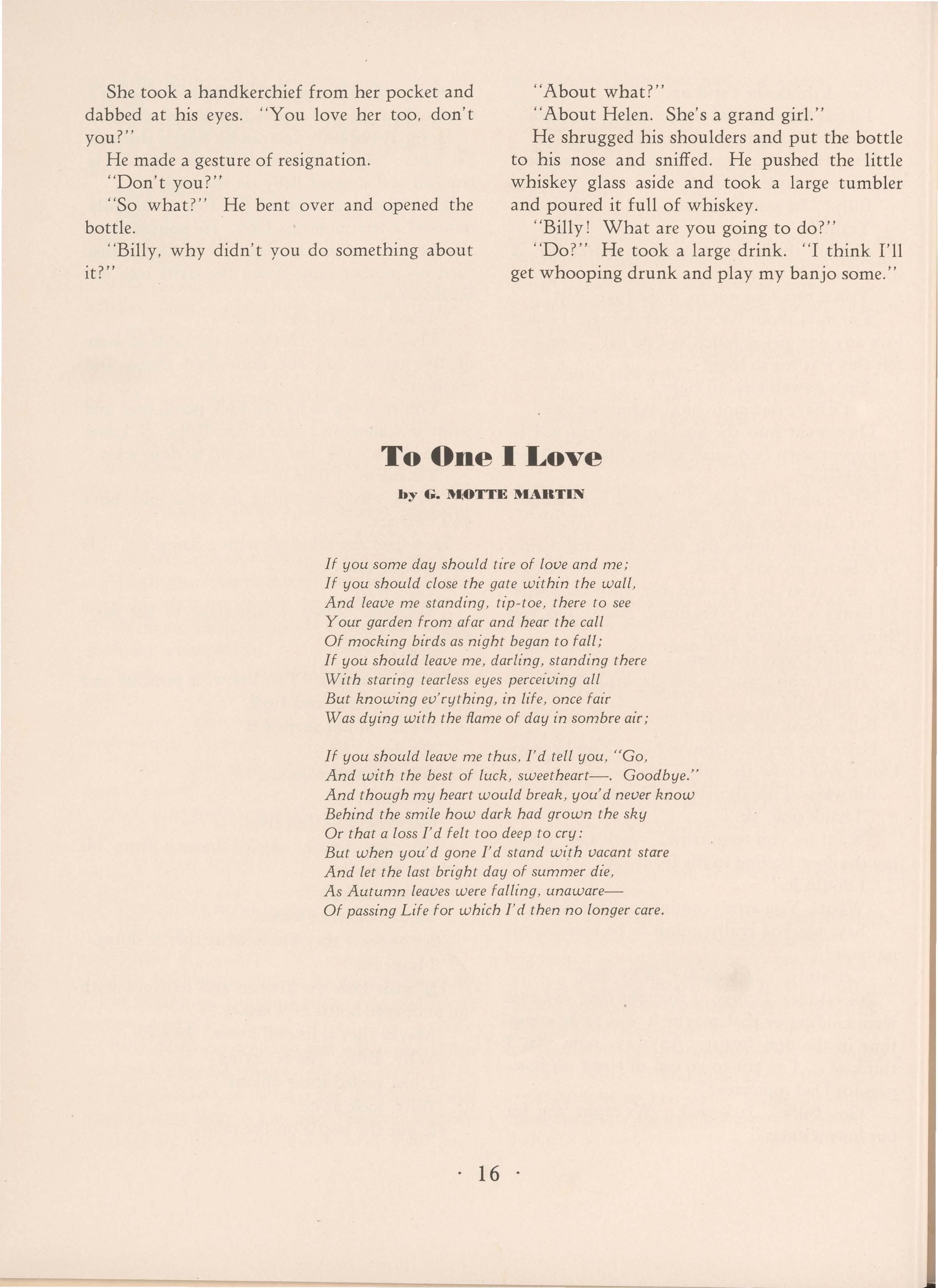
"About what?"
"About Helen. She's a grand girl." He shrugged his shoulders and put the bottle to his nose and sniff ed. He pushed the little whiskey glass aside and took a large tumbler and poured it full of whiskey.
"So what?" He bent over and opened the bottle. "Billy! What are you going to do?"
"Billy, why didn't you do something about "Do?" He took a large drink. "I think I' 11 get whooping drunk and play my banjo some." . ? " 1t.
by G. MOTTE MARTIN
If you some day should tire of love and me; If you should close the gate within the wall , And leave me standing , tip-toe , there to see Your garden from afar and hear the call Of mocking birds as night began to fall; If you should leave me , darling , standing there With staring tearless eyes perceiving all But knowing ev'rything , in life , once fair Was dying with the flame of day in sombre air ;
If you should leave me thus , I'd tell you , "Go, And with the best of luck , sweetheart-. Goodbye." And though my heart would break, you'd never know Behind the smile how dark had grown the sky Or that a loss I'd felt too deep to cry: But when you ' d gone I'd stand with vacant stare And let the last bright day of summer die , As Autumn leaves were falling , unawareOf passing Life for which I'd then no longer care
IT WOULD not be a purely speculative statement to say that this magazine , The Messenger , of the University of Richmond, goes to press in its sixty-third year boasting a literary heritage and background which equals or excels that of any current college publication. We are proud to point to the fact that our magazine is a direct outgrowth of Edgar Allan Poe's Literary Messenger . With pride we sing the praises of those who have in the past edited and published the Richmond College and Westhampton Messengers. Many of these student leaders of yesteryear have made their mark in the literary world of today We are justified in being proud of our history.
With this issue the student bodies of Westhampton and Richmond Colleges merge for the first time their literary abilities in order to produce an even greater publication. This merger must not be in vain The staff has worked diligently on this , the first number of the current volume, but we feel that a better cooperative at-
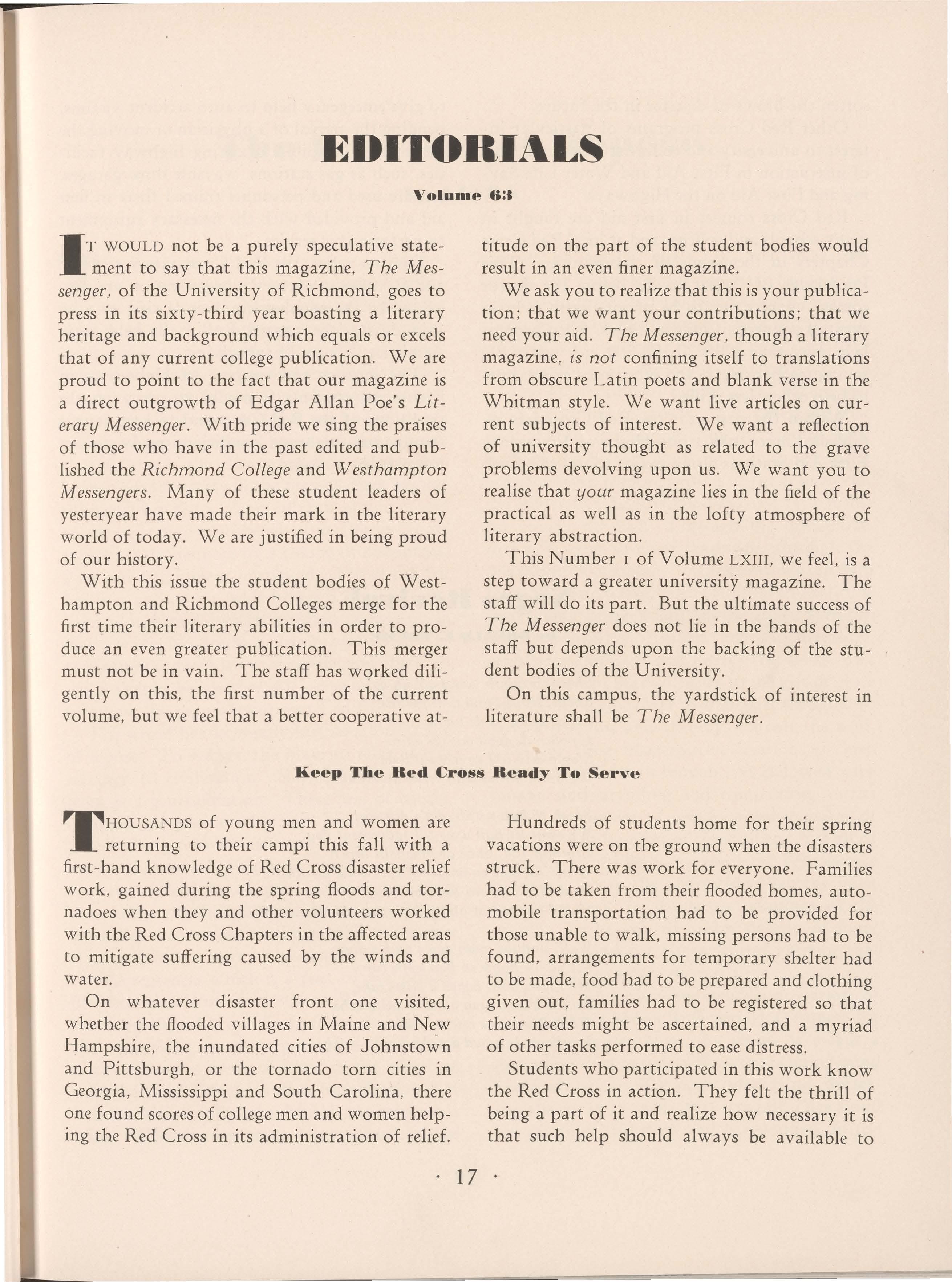
Ttitude on the part of the student bodies would result in an even finer magazine.
We ask you to realize that this is your publication; that we want your contributions ; that we need your aid. The Messenger , though a literary magazine, is not confining itself to translations from obscure Latin poets and blank verse in the Whitman style. We want live articles on current subjects of interest. We want a reflection of university thought as related to the grave problems devolving upon us. We want you to realise that your magazine lies in the field of the practical as well as in the lofty atmosphere of literary abstraction.
This Number I of Volume LXIII , we feel, is a step toward a greater university magazine. The staff will do its part. But the ultimate success of The Messenger does not lie in the hands of the staff but depends upon the backing of the student bodies of the University.
On this campus , the yardstick of interest in literature shall be The Messenger.
HOUSANDS of young men and women are returning to their campi this fall with a first-hand know ledge of Red Cross disaster relief work, gained during the spring floods and tornadoes when they and other volunteers worked with the Red Cross Chapters in the affected areas to mitigate suffering caused by the winds and water.
On whatever disaster front one visited, whether the flooded villages in Maine and New Hampshire, the inundated cities of Johnsto~n and Pittsburgh , or the tornado torn cities in Georgia , Mississippi and South Carolina , there one found scores of college men and women helping the Red Cross in its administration of relief.
Hundreds of students home for their spring vacations were on the ground when the disasters struck. There was work for everyone. Families had to be taken from their flooded homes , automobile transportation had to be provided for those unable to walk , missing persons had to be found , arrangements for temporary shelter had to be made, food had to be prepared and clothing given out, families had to be registered so that their needs might be ascertained, and a myriad of other tasks performed to ease distress.
Students who participated in this work know the Red Cross in action. They felt the thrill of being a part of it and realize how necessary it is that such help should always be available to
soften the blows of disaster in the future.
Other Red Cross programs of particular interest to university and college students are those of instruction in First Aid and Water Life Saving and First Aid on the Highways.
Red Cross courses in first aid are taught in many schools and colleges and at local Red Cross Chapters in thousands of communities. This knowledge of "what to do before the doctor comes" enables one to be of intelligent help in event of accident or sudden illness, when prompt help may save a lift. Like first aid, water life saving teaches safety, and when need arises, how to help others less skilled.
Within the past year the Red Cross has established more than 1 , 000 Highway Emergency First Aid Stations along major routes of travel,

to give emergency help to auto accident victims, pending the arrival of a physician or moving the victim to a hospital. Existing highway facilities, such as gas stations, wayside inns, garages, etc. are used and personnel trained there in first aid and provided with the necessary equipment to perform this service.
Disaster relief, the Red Cross safety services, and all other work of the organization are supported by the membership dues of citizens who join during the annual Roll Call, held from Armistice Day to Thanksgiving.
The interest and support of University of Richmond students is needed to carry on the traditions of the Red Cross and to keep it in a strong and vigorous condition, ready to act when help is needed.
by DONALD E. TRUMP
Shout , brothuh , waue yo' ahms! Shout, sistuh , sing elem psalms! Let de glory ob de Lamb come in En burn de debil out yo ' skin. Stamp dem feet en make it loud! We gotta get sinnuhs from dis crowd.
Speak to huh sistuh , dat ' s de way! We caint let huh wait till judgement day Brothuh Jud , mine de moanahs bench While Ah goes en prays fo ' dat cullud wench. De debil' s way em long en wide, You'd best repent oh he ' ll burn yo' hide.
Well , sinnuhs , mah day ' s wuk ' s done. I' se gwine home en hab some fun. Ma Liza ' s done baked a lasses cake, En J'se gwina pray ginst de belly ache. Then J'se gwine rest en pray En thank de Lawd dat Ah liued to-day.
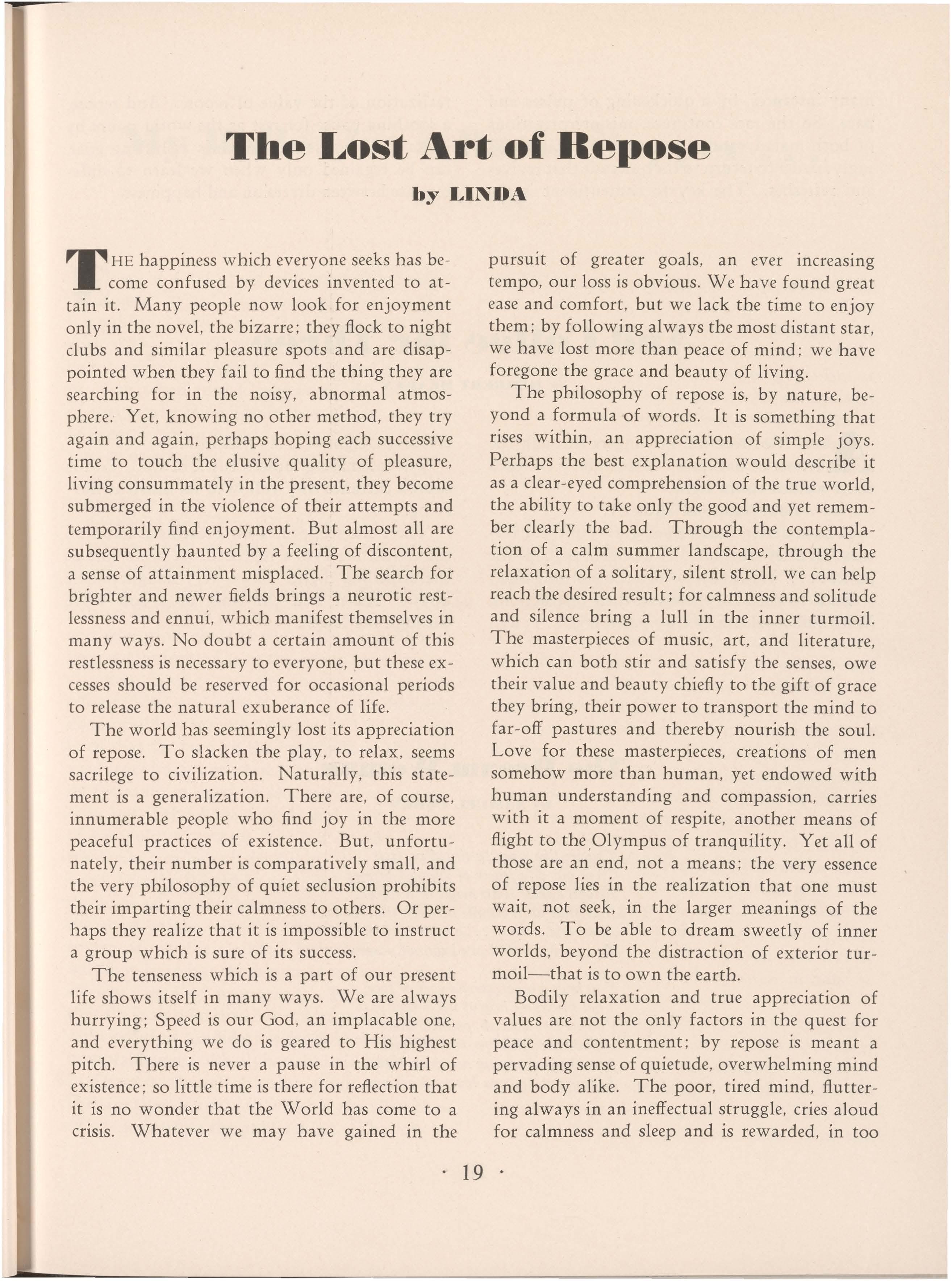
by LINDA
TH E happiness which everyone seeks has become confused by devices invented to attain it. Many people now look for enjoyment only in the novel, the bizarre; they flock to night clubs and similar pleasure spots and are disappointed when they fail to find the thing they are searching for in the noisy , abnormal atmosphere. Yet , knowing no other method , they try again and again , perhaps hoping each successive time to touch the elusive quality of pleasure , living consummately in the present , they become submerged in the violence of their attempts and temporarily find enjoyment. But almost all are subsequently haunted by a feeling of discontent, a sense of attainment misplaced. The search for brighter and newer fields brings a neurotic restlessness and ennui , which manifest themselves in many ways No doubt a certain amount of this restlessness is necessary to everyone, but these excesses should be reserved for occasional periods to release the natural exuberance of life.
The world has seemingly lost its appreciation of repose. To slacken the play , to relax, seems sacrilege to civilization Naturally , this statement is a generalization. There are , of course , innumerable people who find joy in the more peaceful practices of existence . But, unfortunately, their number is comparatively small, and the very philosophy of quiet seclusion prohibits their imparting their calmness to others. Or perhaps they realize that it is impossible to instruct a group which is sure of its success.
The tenseness which is a part of our present life shows itself in many ways We are always hurrying ; Speed is our God , an implacable one , and everything we do is geared to His highest pitch. There is never a pause in the whirl of existence ; so little time is there for reflection that it is no wonder that the World has come to a crisis. Whatever we may have gained in the
pursuit of greater goals , an ever increasing tempo, our loss is obvious. We have found great ease and comfort , but we lack the time to enjoy them; by following always the most distant star , we have lost more than peace of mind ; we have foregone the grace and beauty of living.
The philosophy of repose is , by nature , beyond a formula of words. It is something that rises within , an appreciation of simple joys. Perhaps the best explanation would describe it as a clear-eyed comprehension of the true world, the ability to take only the good and yet remember clearly the bad Through the contemplation of a calm summer landscape, through the relaxation of a solitary , silent stroll, we can help reach the desired result; for calmness and solitude and silence bring a 1ull in the inner turmoil. The masterpieces of music, art , and literature, which can both stir and satisfy the senses, owe their value and beauty chiefly to the gift of grace they bring , their power to transport the mind to far-off pastures and thereby nourish the soul. Love for these masterpieces, creations of men somehow more than human , yet endowed with human understanding and compassion , carries with it a moment of respite , another means of flight to the ,Olympus of tranquility. Yet all of those are an end , not a means ; the very essence of repose lies in the realization that one must wait, not seek , in the larger meanings of the words. To be able to dream sweetly of inner worlds , beyond the distraction of exterior turmoil-that is to own the earth.
Bodily relaxation and true appreciation of values are not the only factors in the quest for peace and contentment ; by repose is meant a pervading sense of quietude , overwhelming mind and body alike The poor , tired mind, fluttering always in an ineffectual struggle, cries aloud for calmness and sleep and is rewarded , in too

many instances, by a quickening of pulses and pace. So the race continues, misinterpretations of both malady and remedy making it increasingly harder to return to the quietude that revives and refreshes. The key to contentment is the realization of the value of repose. And repose, a soothing pause for rest as the world pours by in its meaningless race towards a shifting goal, can be regained only when we learn to differentiate between diversion and happiness.
by HERBERT DEADEN
ADA WN of rose ran her fingers through the tresses of_darkness. A shrubbery enclosed court yielded to the light.
" ... Your weapons," quietly.
A hard driven coach slued gravel in the driveway. A brief murmur , "Gentlemen, perhaps the police ... ," trailed away into the morning mist. Back to back they received their instructions . With sullen solemnity they paced it off, five, six, seven, eight , listened
The fascinating, unseen rustle of silk. To the court's entrance they followed its insistent hurrymg.
There she stopped , a bit breathless , hand on the trellis, her eyes a reproach. A voice soft as the dispelling night , "Two very naughty little boys." Relief and the trace of a sob wove through her laugh.
by SAMUEL COHEN
You are like a pearly-tinted portrait
Crept out of a frame of dappled bronze
As you appear with magic of a comet
And glide with a smile between the fronds. Aloof and straight ... a sable-looking goddess You are to me, 0 Love I cannot possess.
You have a quiet, candid sort of face
That mocks all lustful stares that pass. You are like a garish , painted Grace Espied through silver-frosted glass , But you have no joy nor dark distress
As humans do , you lovely Scorceress. · 20 ·

by ARTEE
EV E N if I had paid my taxes , I wouldn't vote. Why? For the simple reason that I wouldn ' t know how. If you had paid your part of the political plunder , would you know how to vote? I doubt it ! ' Tis indeed a serious problem wh en ninety percent of the citizenry of this great nation admit they cannot vote intelligently ; when ninety percent approach their just-as - uninformed fellow men , with a sample ballot in their hands , and say, " Check off the r ight men. For whom shall I vote ?"
It should be said in self-defense that this dilemma in which we find ourselves is not entirely of our own making. The man who works eight hours a day and at the same time attempts to balance his diet of living with a little social life and recreation , finds it well-nigh impossible to keep well inform ed as to the intricacies of political maneuvering and the character of public office-holders and seekers He turns to his next door neighbor for information and advice and finds that the man on the other side of the back yard fence knows no more than he He may turn on his radio in quest of an answer to his question , but if the demagoguery and mud slinging of our political orators does not disgust him to th e extent that he switches his dial to a hot swing band , then he should be excluded from vote on the basis of mental incompetence. The man of the mass might consider the newspaper as a source of reliable political knowledge , but he will soon learn it is the campaign manager ' s most efficient organ of propaganda. It seems , then , that the man who sincerely wants to vote for the right political candidate is faced with an insurmountable mass of ballyhoo , hot air , and hooey.
There is , though , a faint glimmer of hope . Perhaps there is a way in which we can dele these efforts to confuse the public mind . The follow-
ing little bit of reasoning may help you find the way to a solution.
Most of us know a little psychology ; ( or perhaps it's a little common sense which we like to glorify with the term " psychology). But at least we know the difference between an introvert and an extrovert; and knowing this , we need to ask only one question concerning the candidate. " Is he a back-slapper? " If he is , vote for him !
Here are the reasons. We cannot , by the wildest stretch of the imagination , visualize an introvert going about offering the glad hand , kissing the baby ' s besmeared countenance , and backslapping heartily . His very nature would revolt against it. He just isn't made that way , and he wouldn't do it for any political office. We can , therefore , place the introvert in the " non-back-slapper " category. But why should this condemn him as a political candidate ? To quote Henry C. Link, noted psychologist; " The introvert or selfish person avoids the trouble of meeting people; he evades the obligations of clubs and committees. The introvert has no time for the things he dislikes to do Afraid of ~aking mistakes and of embarrassing himself , he risks no action He devotes his energies to the narrow subject of himself. " This isn't a favorable character sketch for a man in public office, is it? Not so long ago a high public official became known as the "Sphinx ," because he said nothing, and did nothing. He " risked no action " for fear of making a mistake , and the greatest mistake he could have made was inactivity.
But the extrovert fits right into the backslapping role. He goes out of his way to meet people and accepts club and committee responsibilities. He does the things he dislikes to do , and so enjoys more the things he loves. " The extrovert may be afraid too , " says Link , " But still
acts, and by his mistakes and suffering, ultimately achieves skill and confidence." The extrovert usually displays unselfish and broad I
views on matters of public interest. He is inherently more honest than the introvert. These characteristics sound like those which might be desirable in a public official.
The reasoning is simple , isn't it? The intro-
vert can't back-slap; the extrovert loves it. The extrovert has the better qualifications for political office. And so we have narrowed the field of choice somewhat. Until I learn a better way, I shall ask, "Is he a back-slapper?" And if he is, I' 11vote for him.
My ballot for a back-slapper!

LO!
YON COM ET , who swims thru ' space ever timeless, Can it be so heavy and yet so steady? Whence came it?
Whither doth it go? Is it perhaps a broom to sweep The Cobwebs
From the enduring gems that shine Forth in Thee ,
0 Mighty Sky?
0 Timeless Space!
But whither goeth Mankind When it dies?
To Celestial Halls?
To Golden Streets ?
Is that Eternity?
Is there Eternity?
Space, 0 Timeless Space , ' Tis Thee I worship!!
0 Timeless Space!

by F. W. T.
WELL, my dears, your bedtime story is going to be different tonight."
Margaret adjusted her arch-supporters Clara coughed and inspected her handkerchief carefully Teddy continued to correct his students' term papers.
Seeing that I had a thoroughly interested, if not interesting audience, I went on with the tale. But even before I could start to go on with the tale, Teddy asked, "What's the population of Vilvorde?"
Always prompt to answer any question which the children might propound, I replied with exactitude , "I 5,693 as of March 3, I 966."
I started the tale, "So, my dears, I shall tell you tonight of the adventures that befell one named Parkanitis and what he lived for. This Parkanitis one fine day decided that Squire was an excellent magazine."
"Even as you, daddy?" asked Clara sweetly between coughs.
"Yes, apple of my eye, even as I."
Margaret clacked her arch-supports together gleefully. "Oh, listen, Teddy dear, daddy is a poet."
Teddy laid down his pencil, filled his pipe, and said thoughtfully, "Daddy, how about reciting a bit of your own poetry for us?"
"But don't you want to hear the rest of the story?"
"Oh, that can come later."
"No, dear children, one thing at the time."
Cries of, "Please, pretty please," rended the air, but I was firm in my stand. Margaret had lost her Buck Rogers Rocket Pistol, so I was safe.
"Now this person, Parkanitis, decided even as I that Squire was a good magazine, so he
started to write stories which he hoped and prayed would be published in said periodical. And why not?"
"We're supposed to ask the questions, grayhaired pop of mine,'' smiled Clara refreshing her supply of lipstick.
I continued as in a dream. "He was successful in his writing until he sent in his first story. The next hundred and fifty rejection slips came easily. The money he spent on postage would have raised the mortgage on Siam."
I was puzzled, frankly puzzled. I had uttered some I 2 7 words, and the quiet little group had not made a single pun. I pocketed my amazement and took a stiff drink of milk.
"Suddenly one day in a fit of despair, he addressed a manuscript to the Woman's Home Companion.
"From that day on his fortune was made, and he stopped working. All he had to do once a month was to tear a rejection slip from a story originally to Squire and mail the tale to the Woman's Home Companion.
"Every night when he went to bed he said this prayer in poetry form, even if it is not poetry."
The three dear little candy drops, their mothers were slightly off color, leaned forward eagerly to hear the pearls of poetry that oozed from my osculators.
"Screeching stars Streak their courses thru' eternity.
I
Sit dumb in a world Gone
Mad!"
Brrrrrrr .... Damn that alarm clock, always rings at the wrong time.
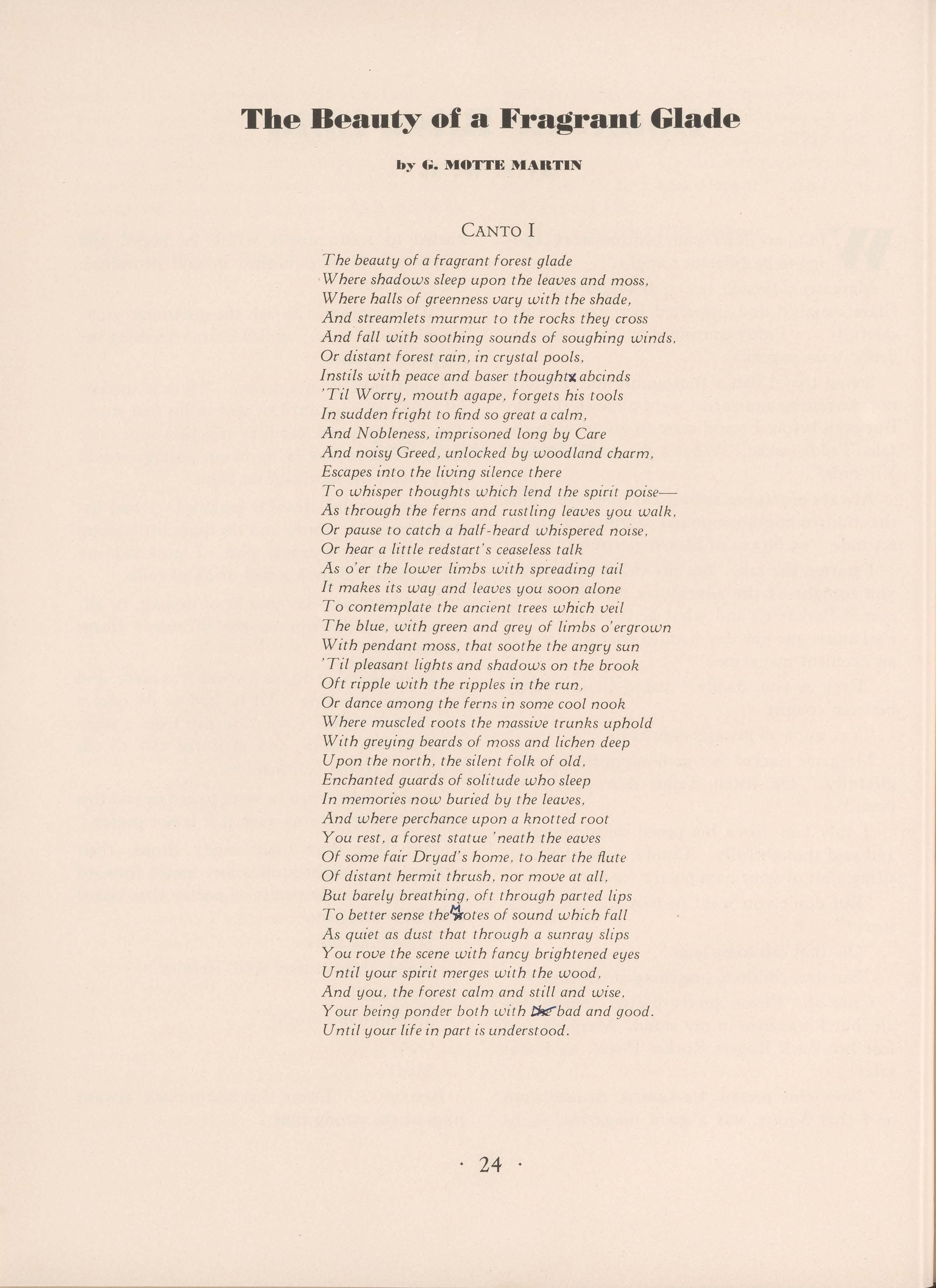
by G. MOTTE MART.IN
CANTO I
The beauty of a fragrant forest glade
Where shadows sleep upon the leaves and moss , Where halls of greenness vary with the shade , And _ stream lets murmur to the rocks they cross And fall with soothing sounds of soughing winds , Or distant forest rain , in crystal pools
Instils with peace and baser thoughtt. abcinds ' Til Worry , mouth agape , forgets his tools In sudden fright to find so great a calm , And Nobleness , imprisoned long by Care And noisy Greed , unlocked by woodland charm , Escapes into the living silence there
To whisper thoughts which lend the spirit poiseAs through the ferns and rustling leaves you walk , Or pause to catch a half-heard whispered noise , Or hear a little redstart ' s ceaseless talk
As o ' er the lower limbs with spreading tail It makes its way and leaves you soon alone To contemplate the ancient trees which veil
The blue , with green and grey of limbs o ' ergrown With pendant moss , that soothe the angry sun ' Til pleasant lights and shadows on the brook Oft ripple with the rippl es in the run , Or dance among the ferns in some cool nook Where muscled roots the massive trunks uphold With greying beards of moss and lichen deep Upon the north , the silent folk of old , Enchanted guards of solitude who sleep In memories now buried by the leaves , And where perchance upon a knotted root You rest , a forest statue 'neath the eaves Of some fair Dryad's home , to hear the flute Of distant hermit thrush , nor move at all , But barely breathing , oft through parted lips To better sense theM,rotesof sound which fall As quiet as dust that thro u gh a sunray slips
You rove the scene with fancy brightened eyes
Until your spirit merges with the wood , And you , the forest calm and still and wise , Your being ponder both toith t:J,,t!"badand good. Until your life in part is understood.
by MITCHELL KATZ
Dear Son , Jan . I
Since this is the first of th ~ year , I thought I'd start it right and write you You know we haven ' t heard from you since you left in September for Bankley ; so why don't you sit down and send us a letter? Even your dear Mother has lost pati ence. I suggest you tell us what you think of school, and what y ou ar e doing-if it wouldn't tax you too much You don ' t have to acknowledge receipt of your monthly allowance. The fact that you haven ' t asked for more settles that question.
Aunt Emily is living with us now Between her and your dear Mother , I wish I were at Bankley! Your , FATH E R .
Dear Dad ,

Jan . r 5
I w as almost in ex am period when I got your letter so I didn ' t write you until all was over if not well. I didn ' t like your crack about th e allowance , but Dr. Downs , our psychology prof, says we must humor our parents so I'll forget it. Bankley is 0 K. ·but the courses are all stiff Prof. Stanley insists that I keep my math homework up to date , and you know how math and me mix ! I've been a trending classes, but I'm having a swell time on the campus I joined Tau , for which I need an extra two hundred , but since it is your fraternity I know you won't mind . Please send it at once . Don't take any wooden nickles l Dear Son , Love , BILL.
Jan. 20
I'm glad you joined Tau , but haven ' t initiation fees gone up since my time ? I'm inclosing $ 100.
I got your semester report , and it is even worse than the midsemester , about which I kindly said nothing. Now , I ask you , Son , is it right for me to spend all that money and you get an E in Math , and two D's in English and German? You take after your old man in History. How many of Dr. Twitchell' s jokes did you laugh at to get that A?
That stock I bought you is down two points , but don ' t worry-it'll go up ; I've never slipp ed yet For God ' s sake send love to your Aunt Emily in your next letter. You know how she talks-on and on ! Your , DAD ,
Feb 10
Dear Dad,
I really meant to write sooner, but you know how it is at school, besides I've been very interested in certain things here. I couldn't tell you unless you were my Dad because I'm sworn to secrecy-but of course you won't say an y thing , will you? It's like this: A fellow comes up to me in the campus as I'm on my way to Gordon Hall and says , " Are you going to stand by and do nothing? " So I say : " Whatcha mean? " He comes up real close and whispers: " The moment is not yet at hand ! Say nothing , " and walks off fast. I'm too surprised to say anything until he ' s a block away I don ' t even remember what be looks like, but I wonder who is crazy .
The next day who should come up but the same guy. He says in a funny sort of whisper : " Are you with us?" So I ask him what it's all about. He swears me to secrecy and tells me it is our duty to support the Strikers in Beadesville ( which is only fifty miles away.) I remember you always tell me not to shirk my duties . so I tell him 0. K
Last night I attended a meeting and a won-
derful speaker from the people told us all about the rotten capitalistic system and how workers don't have any rights. Naturally, I got mad at all capitalists and joined them. I am proud to be one of us, and I was lucky to be appointed to go to Beadesville. \Ve leave in two days.
Love, BILL.
P. S. Send me $25 to make the trip. We commoners must stick together!
FEB. 12
ARE YOU CRAZY STOP DON'T DO A THING STOP EMILY READ LETTER FIRST STOP SEND HER LOVE NEXT TIME STOP SHE CALLS YOU A RED STOP IF YOU GO TO BEADESVILLE WILL CUT OFF YOUR ALLO\\T ANCE DAD.
Feb. 20
Dear Dad,
You were right. I cannot tell a lie. I went to Beadesville. When we got there, ( there were 5 o of us), a ,very tough-looking guy gave us placards, and told us to parade through the streets. He led us. We had a swell parade until we got on Main St., when some cops came up and told us we had to have a permit. Did you know you have to have a permit to have a parade! The tough-looking guy, whose name is something I can't pronounce so I don't know how to spell, got real sore. He said: "This is a free country, isn't it! Ha! Then we can parade. Ha! I know my rights. Ha!'' The cops said to break it up. Then he got tougher and called them names. "You lousy cops! Ha! I know my rights. Ha!" and like that, but now the cops got mad. What he said wouldn't have been so bad except for those nasty-sounding "Ha!-s," which kept making the cops madder and madder. They just said: "Shut up!", and "Scram, you guys!" The tough guy doesn't ask us what we think, but just says: "Don't pay no attention to them lousy cops," and starts to make a speech. When
the cops ask if we're going, some guy in the middle of the parade yells "No!" Then about a million cops start after us. Somebody hits one. When it was over, I had a black eye and it cost me $50 to get out of jail.
Please send me $50 as I am broke. All my love to Aunt Emily.
Best love, BILL.
Feb. 25
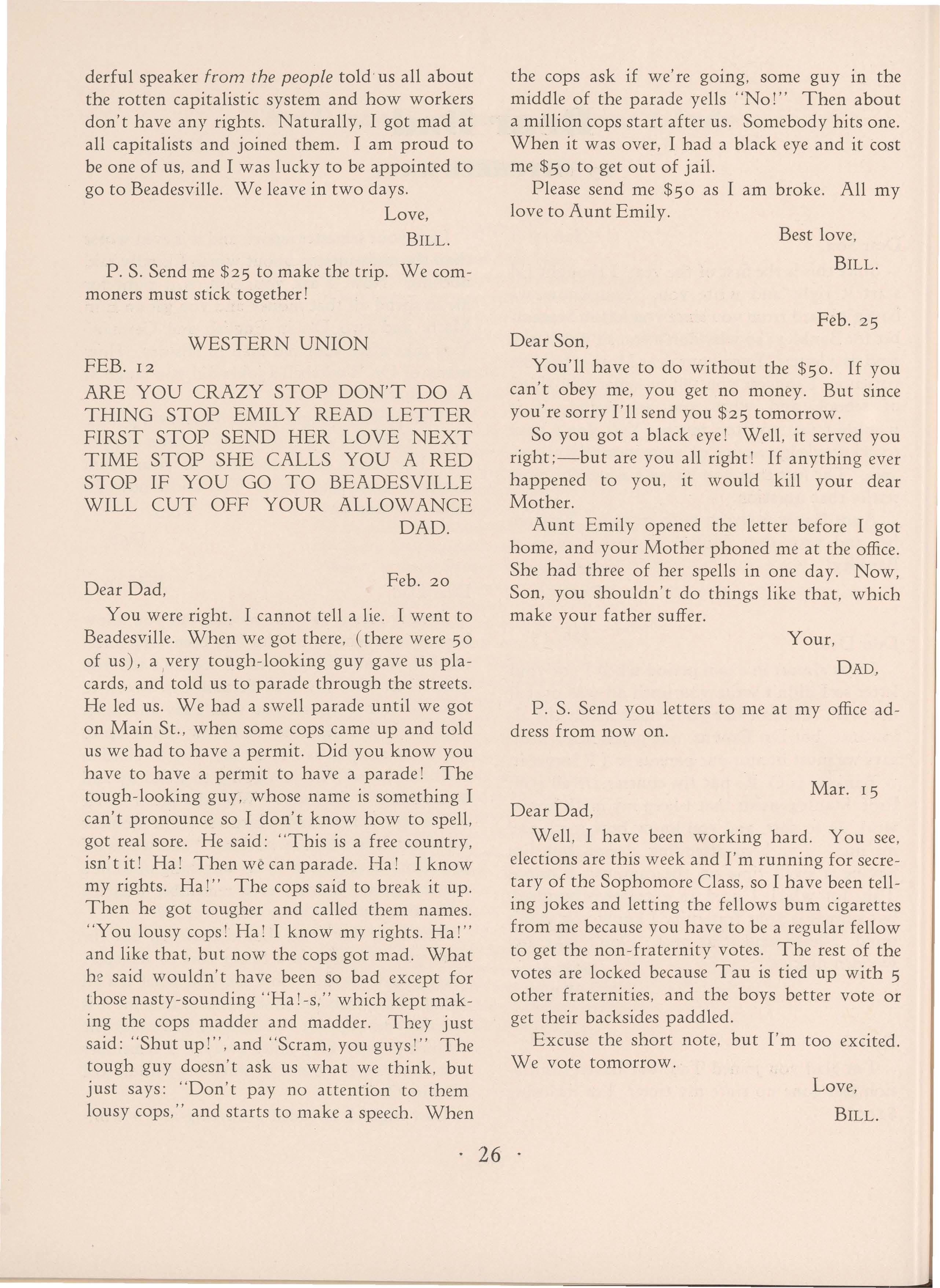
Dear Son,
You'll have to do without the $50. If you can't obey me, you get no money. But since you're sorry I'll send you $25 tomorrow.
So you got a black eye! Well, it served you right;-but are you all right! If anything ever happened to you, it would kill your dear Mother.
Aunt Emily opened the letter before I got home, and your Mother phoned me at the office. She had three of her spells in one day. Now, Son, you shouldn't do things like that, which make your father suffer.
Your, DAD,
P. S. Send you letters to me at my office address from now on.
Mar. 15
Dear Dad,
Well, I have been working hard. You see, elections are this week and I'm running for secretary of the Sophomore Class, so I have been telling jokes and letting the fellows bum cigarettes from me because you have to be a regular fellow to get the non-fraternity votes. The rest of the votes are locked because Tau is tied up with 5 other fraternities, and the boys better vote or get their backsides paddled.
Excuse the short note, but I'm too excited. We vote tomorrow.
Love, BILL.
Mar. 17

Dear Dad,
There must be something wrong because I wasn ' t elected. I figured out all my votes and I should have won easily. There is only one thing -some of those fellows must have forgotten because everybody who took my cigarettes promised to vote for me The whole house is down on me As if it is my fault that I lost ! But sticks and stones may break my bones but words will never harm me !
Gosh, Dad , but I was all broken up Doggone it, I had counted on being elected !
That night , however , we had a dance at the house. Honest , Dad , I've never worried much about women , but I met the swellest girl. She's right small, but she has the most beautiful eyes. All the fellows rushed her, but I got her out an the porch and found out she wasn ' t a bit sophisticated or anything like that. I got serious , but she wouldn't listen. Well, it takes time !
Love , BILL.
All right , give my regards to Aunt Emily
Mar . 19
Dear Son ,
So you have gone out and got yourself a girl, eh ? You ' re mor e and more like your Old Man every day Well, it won't hurt you-if she's a nice girl. You might tell us something about her . The election was tough on you , but I guess the girl keeps your mind off it.
Your Aunt Emily was pleased at your sending love. She insisted last night that the soup was delicious . We are sending you a combined check of $ 1 oo for your birthday When I see your marks , I may sign it.
Your dear Mother has gone on a cruise to Bermuda. She had another sick spell. She had a terrible headache until I put her on the boat , when she said that she felt better already. I wonder if your dear Mother ever suspects that I suspect something about her health. She took Aunt
Emily with her so you will be welcome company during the Spring Holidays. With no women in the house , I'm getting my first real rest since your dear Mother's last trip.
I'm going to drive up and get you. It'll be good to see you again. We'll have some swell times together , just the two of us
Your , DAD ,
P. S. I got those bills you sent me One of them was an I. 0 . U. If you can ' t play poker any better than your Old Man, you better stop!
Mar. 28
Dear Dad,
It's swell of you to drive up to get me . I'm really tickled pink It' 11sure be good to see you again , Dad. As you say , you ' ll have a rest
By the way , five of the fellows in the house are coming down to visit us, and the car will make things easier I know you don't like to ride three in the front seat , but I never beard you object to four in the back . You can try it out, anyway
I'm only 8 assignments behind in Math now. Prof says if I make them all up , I may pass-if I get a 100 on the exam . I wouldn't want him to ,do me any favors !
Please bring your checkbook. You see the florist has been after me A fellow can ' t take his girl to a dance without a corsage , can he? The bill is only $ 125 which I am sure you will agree is very little for a whole semester
I can ' t wait for you to get here so we can start for home. Gosh, home again ! But it won ' t be the same without "your dear mother." I have completely squared myself with Aunt Emily. I sent her a cablegram aboard ship. I sent her my love - collect!
Come on , Pop , and get on up here. I want to go home and have that swell time with you that I've been thinking about for a long time.
Your loving son , BILL.
by HERBERT DEADEN
T'WAS a typical night for murder. Chilling drip from eaves, flurries of wind and rain; and fog rolling in from the sea. Under the wharf the slap and suck of water against pilings. Came the river patrol; strong purr of twin deisels, glimpse of a low, grey hull. She raked the wharf with her powerful light and was gone, her wake bubbles swirling.
High on the cliff the gabled house frowned. Its dark approach forbade entrance. In a second story window a weak light gleamed . Shadows against the curtains loomed.
In a sudden gust of wind the back door creaked open and slammed. An eerie cry rose on the night wind to curse the house. Mr. Jones had put out the cat.
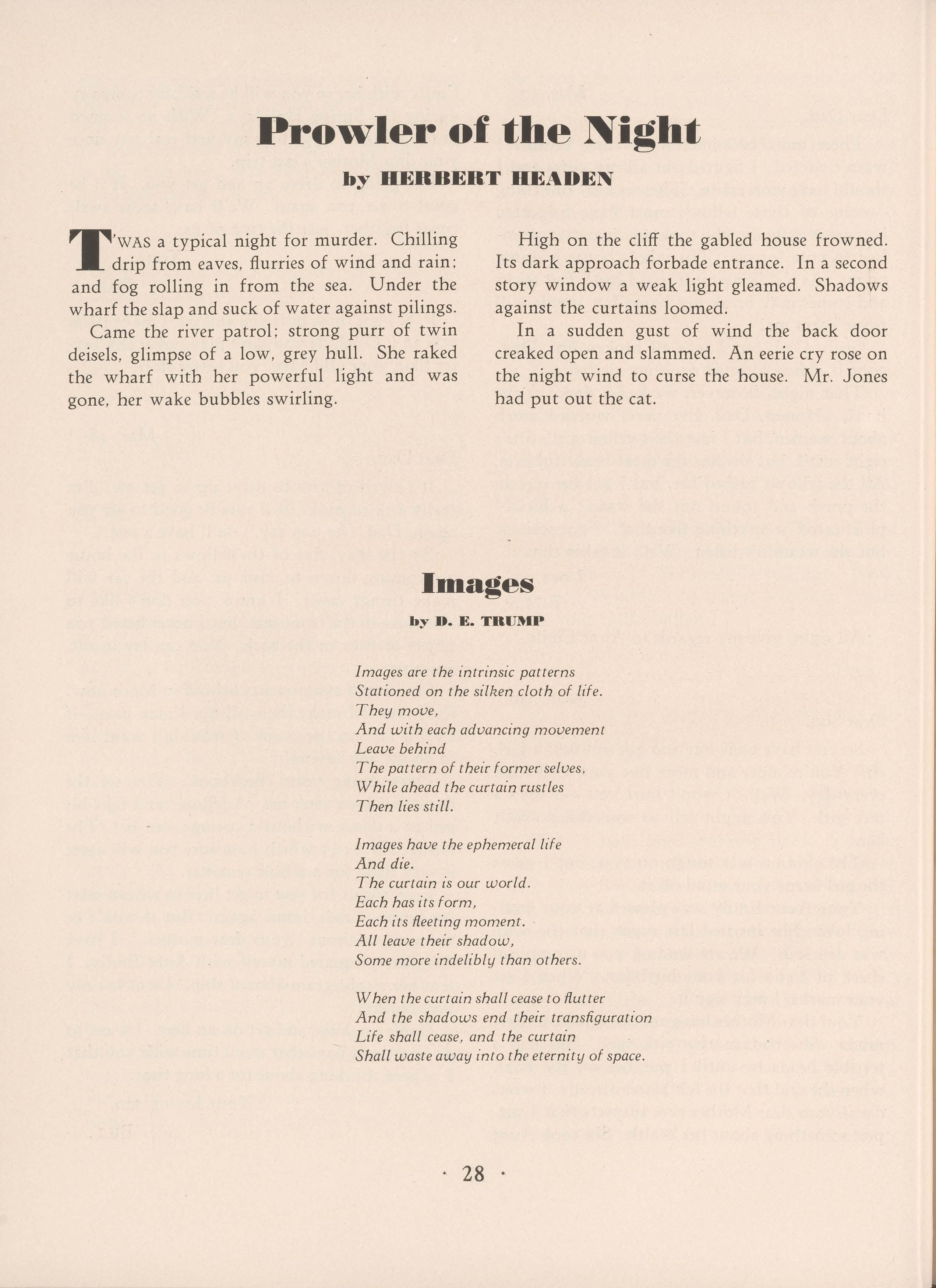
by D. E. TRUMP
Images are the intrinsic patterns Stationed on the silken cloth of life They moue, And with each advancing movement Leave behind The pattern of their former selves , While ahead the curtain rustles Then lies still.
Images have the ephemeral life And die. The curtain is our world. Each has its form, Each its fleeting moment. All leave their shadow , Some more indelibly than others.
When the curtain shall cease to flutter And the shadows end their transfiguration Life shall cease, and the curtain Shall waste away into the eternity of space

by STUART GRAHAM
~ONSIGNED to a back seat for fifteen years by the popularity of the radio, collections of phonograph records are again coming into their own. The family phonograph is being hauled down from the family attic, shorn of its dust and cobwebs, supplied with new needles, and again allowed to delight the eardrums with the best of modern dance music.
It all began with the swift rise of swing music to nation-wide popularity. For over a decade record manufacturers have decried their dwindling revenues, being able to dispose of only enough discs to supply the needs of fraternity houses, nickelodeons, and a few die-hard private collectors. With the advent of swing, however, there has been a different story. "Hot Clubs" (groups of swing fans) have mushroomed from coast to coast, and their demands for records have sent sales soaring. Individuals who want what they want when they want it will be satisfied only with their favorite tune recorded by their favorite orchestra. Some of America's finest dance bands have made impressions for the cheaper discs, and their records are selling like beer at a political rally. The fever is contagious.
It is hoped that the following review may be of help both to collectors who wish to add to their repertoire and students desiring to start a collection. The discs listed include both current favorites and the hardiest of the old-timers (in streamlined arrangements, of course) without which no collection is complete.
Boston Tea Party , latest of Mal Hallet's infrequent recordings, will be welcomed by fans of long standing who know what fine interpretations this versatile band is capable of. The tune, an impressive late arrival among the swing favorites, is played in slow jig tempo, a perfect set-up for above average trombone and tenor sax
solos. The arrangement also allows the pianist to display a well-developed technique, and for Buddy Welcome to sing all the lyrics (first time we've heard them). On the reverse side is a slow, danceable arrangement of Sweet Misery of Love, with a vocal chorus by Clark Yokum. VOCALION No. 3278.
From Jerome Kern's "Swingtime" score, Bing and Dixie Lee Crosby have recorded A Fine Romance and The Way You Look Tonight, the show's top tunes. Bing, in fine fettle, and Dixie, revealing a better than passable voice, do ample justice to Dorothy Fields' clever lyrics. Victor Young's orchestra provides the musical background. Better to listen to ·than to dance to. DECCA No. 907.
Hal Kemp's original version of You Don't Love Right with vocals by Skinny Ennis will ( we think) sell quite a few copies. A bit on the unusual side, the arrangement reminds one of Hal's very popular I've Got a Date With an Angel. The familiar staccato effects of the Kemp brass section are very much in evidence. On the other side is Knock , Knock, bearable only because it's Hal who does it. BRUNSWICK No. 7720.
A rare Hal Kemp excursion into jungle rhythm is offered in B ' wanga. Three trombones very effectively take over a chorus, then retire in favor of a clarinet, which is in turn replaced by rippling saxophones. Unusual, full effects are obtained by the brass section, which executes several difficult passages. Pucsuin' the Blues, played in strict jig time and featuring romping, trilled saxophones, staccato brass, and a nice trombone chorus , is on the reverse side. BRUNSWICK No. 773 o.
The King of Swing, Benny Goodman, with a quartet composed of clarinet, vibraphone, piano, and traps , offers two old-timers in Moon-
glow and Dinah. The first has a slow, sweet swing, while the latter is strictly jam with a much more decided swing. Each of the musicians rates just about tops for his particular instrument, so you can infer the result. VICTOR No. 25398.
Music in the Morgan Manner furnishes a suave version of three favorites of another decade. Russ Morgan himself demonstrates his virtuosity on the muted trombone in his interpretation of Wabash Blues. The old horn truly talks. A perfectly co-ordinated sax section does most of the work in a medley of Linger Awhile and Stumbling, with a solo by the talented pianist thrown in on the latter. Smooth melody. BRUNSWICK No. 7704.
The torrid trumpet of Wingy Mannone finds

expression in his impression of Afterglow and River Man. We know of several bands that could have surpassed the arrangement of the former, but the trumpet and saxophones render it passable. The latter tune is aptly chosen and jibes perfectly with the Mannone style. A good buy if you like Wingy's vocalizing and hot trumpet rides-otherwise, better save the thirty-five cents. BLUEBIRD No. B-6483.
:
Jazznocracy-White Heat-Jimmie Lunceford and his Orchestra. BLUEBIRD No. B5713.-Until the Real Thing Comes AlongAlways-Charlie Barnet and his Glen Island Casino Orchestra. BLUEBIRD No B-6487.
by MARGARET CARPENTER
You will not pass by this , my door , again ; Though I should doubt the certainty of spring And disbelieve the miracle of rain , And blind my eyes to every lovely thing That God has made , crying it is not so , I know that you will never , never more Pause at my window. This one fact I know: You will not come as you have come before
Though I should put blue candles in the sills , And make a blazing fire of crimson flame , And gather all the daisies from the hills In bright gold vases,-it would be the same.
How strange is life: between us it can place Eternity in such a little space. ·
·
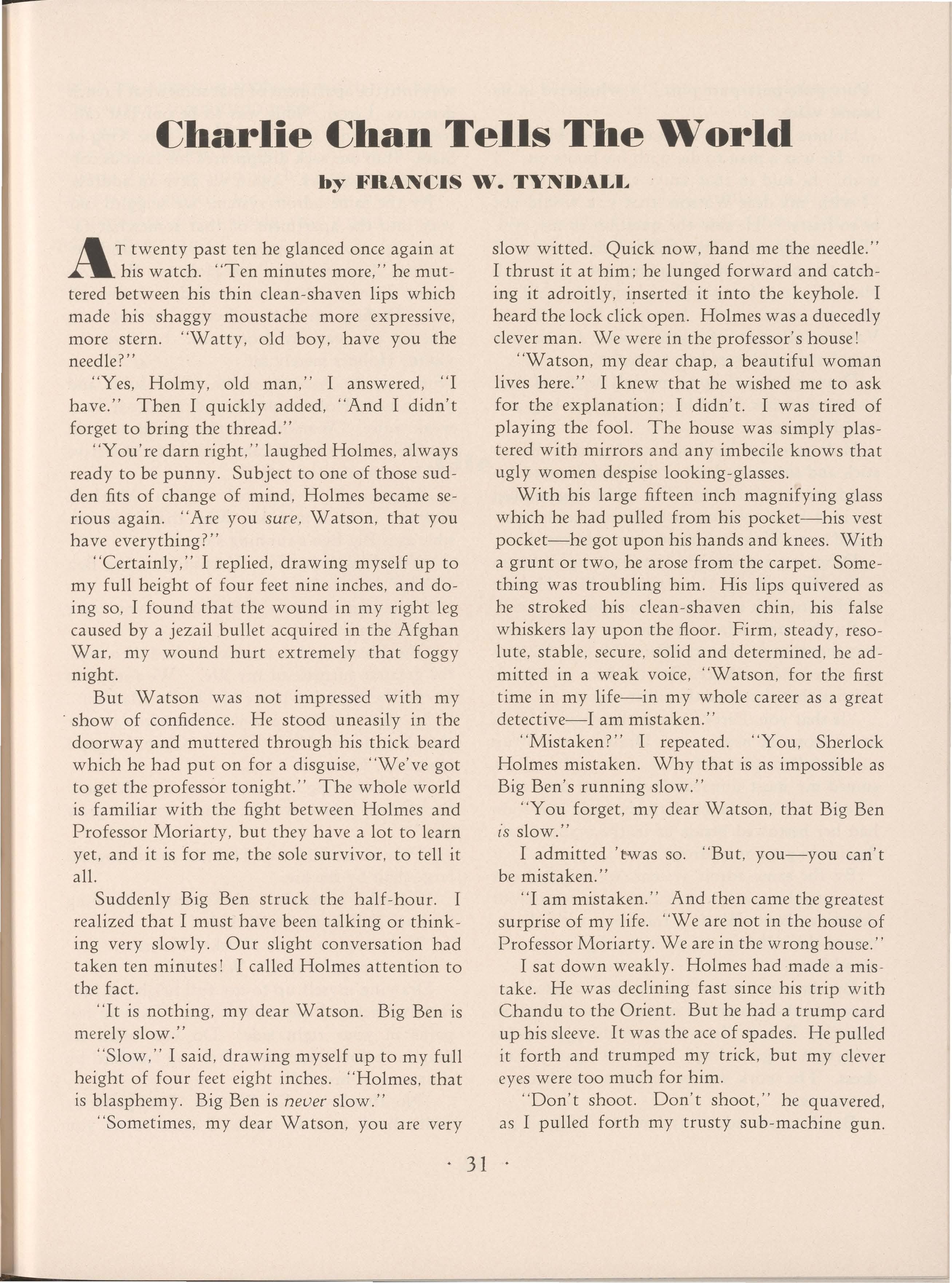
by FRANCIS W. TYNDALL
AT twenty past ten he glanced once again at his watch " Ten minutes more ," he muttered between his thin clean-shaven lips which made his shaggy moustache more expressive , more stern. " Watty , old boy , have you the needle? "
" Yes , Holmy , old man ," I answered , " I have ." Then I quickly added , " And I didn't forget to bring the thread ''
" You ' re darn right ," laughed Holmes , always ready to be punny Subject to one of those sudden fits of change of mind , Holmes became serious again " Are y ou sur e, Watson , that you have everything ?''
" Certainly ," I replied , drawing myself up to my full height of four feet nine inches , and doing so , I found that th e wound in my right leg caused by a jezail bullet a cquired in the Afghan War , m y wound hurt extremely that foggy night.
But Watson was not impressed with m y · show of confidence . He stood uneasily in the doorway and muttered through his thick b eard which he had put on for a disguise , " We ' ve got to get the professor tonight ." Th e whole world is familiar with the fight between Holmes and Professor Moriarty , but they have a lot to learn yet , and it is for me, the sole survivor , to tell it all.
Suddenly Big Ben struck the half-hour. I r ealized that I must have been talking or thinking very slowly. Our slight conversation had taken ten minutes ! I called Holmes attention to the fact .
" It is nothing , my d ear Watson. Big Ben is rnerel y slow. ''
" Slow ," I said , drawing myself up to my full h eight of four feet eight inches. " Holmes , that is blasphemy . Big Ben is neoer slow ."
"Sometimes , my dear Watson , you are very
slow witted. Quick now , hand me the needle." I thrust it at him ; he lunged forward and catching it adroitly , i!lserted it into the keyhole I heard the lock click open Holmes was a duecedly clever man. We were in the professor ' s house!
" Watson, my dear chap , a beautiful woman lives here." I knew that he wished me to ask for the explanation ; I didn't I was tired of playing the fool. The house was simply plast ered with mirrors and any imbecile knows that ugly women d espise looking-glasses .
With his large fifteen inch magnifying glass which he had pulled from his pocket-his vest pocket-he got upon his hands and knees. With a grunt or two , he arose from the carpet . Something was troubling him His lips quivered as he stroked his clean-shaven chin , his false whiskers lay upon the floor. Firm , steady , resolute , stable , secure , solid and determined , he admitted in a weak voice , " Watson, for the first time in my life-in my whole career as a great detective-I am mistaken ' '
" Mistaken?" I repeated . " You , Sherlock Holmes mistaken. Why that is as impossible as Big Ben's running slow ."
" You forget , my dear Watson , that Big Ben is slow.' '
I admitted ' twas so " But , you-you can ' t be mistaken .''
" I am mistaken. " And then came the greatest surprise of my life. " We are not in the house of Professor Moriarty We are in the wrong hou se. "
I sat down weakly . Holmes had made a mistake. He was declining fast since his trip with Chandu to the Orient . But he had a trump card up his sleeve. It was the ace of spades. He pulled it forth and trumped my trick , but my clever eyes were too much for him .
" Don ' t shoot Don ' t shoot, " he quavered, as I pulled forth my trusty sub-machine gun

"Putt-putt-putt-putt-putt," it whispered in its hoarse voice.
Holmes slumped in his seat and put his boots on. He was a man to die with his boots on. '' I wish," he said in that sauve calm voice of his, "I wish, my dear Watson, that you would not be so hasty." He saw the question in my eyes. "Elementary , my dear fellow, elementary. I took the precaution of loading your gun with blanks." In a few simple sentences he told me that we were in the home of Philo Vance. Vance's collection of ceramics were famous the world over, and were here to steal it.
Drawing myself up to my full height of four feet seven inches , I shouldered the heavy bag, and we left the room.
Holmes raised his huge solid gold walkingstick and summoned us a cab which loomed towards us out of the fog. The cabby was muffled up in a huge overcoat which completely concealed him. We gave him our next address.
Dropping a sovereign-the ex- king of Spain -into the palm of the waiting cabby , Holmes told him to wait until we had completed our call.
By the same adroit system, we wiggled our way into the apartment of Perry Mason. Holmes cautioned me to silence. But the floor gave forth a shriek that shattered the silent night.
" Is that you, Perry?" came the voice of Della Street from the next room. Drawing myself up to my full height of four feet six inches, I assumed my most unnatural voice and quavered , "Yes." We were quick with the sack, and soon had her bestowed beside us in the waiting cab. Again we gave an address.
By the same adroit system , we wiggled our way into the apartment of that somewhat s tout detective , Nero Wolfe. Into our sack disappeared the collection of orchids. Again we ga v c an address.
By the same adroit system , we wiggled our way into the apartment of that somewhat short detective, Poirot. Into our sack disappeared his collection of gum drops. Again we gave an address. The work was becoming somewhat monotonous .
By the same adroit system , we wiggled our
way into the apartment of that somewhat French detective, Lecoq. This was to be our last call, for we had only one soverign left-the King of Siam. Into our sack disappeared his famous collection of disguises. Again we gave an address.
By the same adroit system, we wiggled our way into the apartment of that somewhat famous, glamourous , great , celebrated, and renowned detective, Sherlock Holmes. We were home. Into our closet, we stuffed our now full sack. Doffing our hats and coats , we began to take up our various avocations. I played the violin; Holmes merely sat .
Firm, steady , resolute , stable , secure , solid , and determined , Holmes stood and admitted in a weak voice , " Watson , for the second time in my life-in my whole career as a great detective -I have made a mistake."
" Mistaken? " I repeated. " You , Sherlock Holmes , make a mistake . Why that is as imsible as is Big Ben's running slow. "
"You forget , my dear Watson , that Big Ben is slow."
I admitted ' twas so. " But , you-you can ' t be mistaken ."
"But I have made a mistake " And then came the greatest surprise of my life . "We forgot to attend the birthday party of Dr. Fu Manchu."
At that instance a knock sounded at our chamber door. "It's Charlie Chan , " hissed Holmes. "Come in. "
" Good evening , Mr. Holmes , Dr. Watson . So pleased. Have waited many years to greet you."
"Pray be seated ," said Holmes , indicating the large chair by the fire
" Thanks , so much , " said Charlie, bestowing his huge bulk in the small chair.
" You came to see me?" asked Holmes
"No . I came to see Dr. Watson."
Drawing myself up to my full height of four feet five inches , I questioned him. " Do you feel pains in your right side? Do you often see dragons before your eyes ? Are you troubled by shortness of breath?' '
" No , thank you, Dr. Watson . I am perfectly well, thank you , so much. I came to see you
about the numerous robberies which you and your servant committed tonight."
I was aghast. This simple Chinaman had stumbled upon the solution of all our various crimes. For they had all been committed by Holmes and myself, for we in our mad thirst for publicity did anything that would attract public attention.
Out of the corner of my eye , I saw Holmes, the ever faithful servant , creep up behind the chair of the great Chinese detective and
EDITOR ' S NOTE: The · Author ' s next book "The Turning Over of Charlie Chan , " will be published early in the winter of 1946.
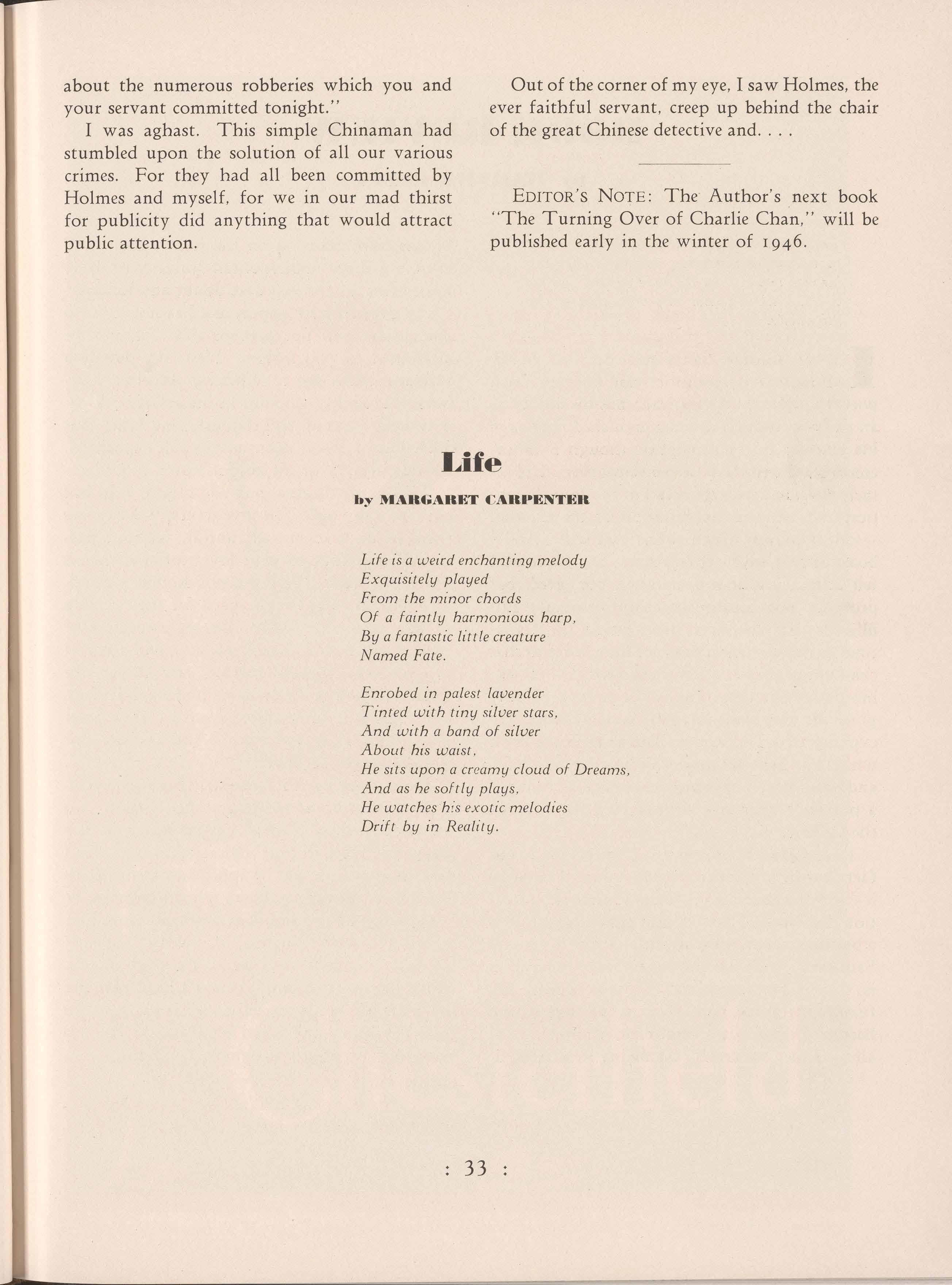
by MARGARET CARPENTEll
Life is a weird enchanting melody Exquisitely played From the minor chords Of a faintly harmonious harp , By a fantastic little creature Named Fate
Enrobed in p alest lauender Tint ed with tiny siluer stars , And with a band of siluer About his waist , He sits upon a creamy cloud of Dreams , And as he softly plays , H e watches h is exotic m e lodie s Drift by in Reality.
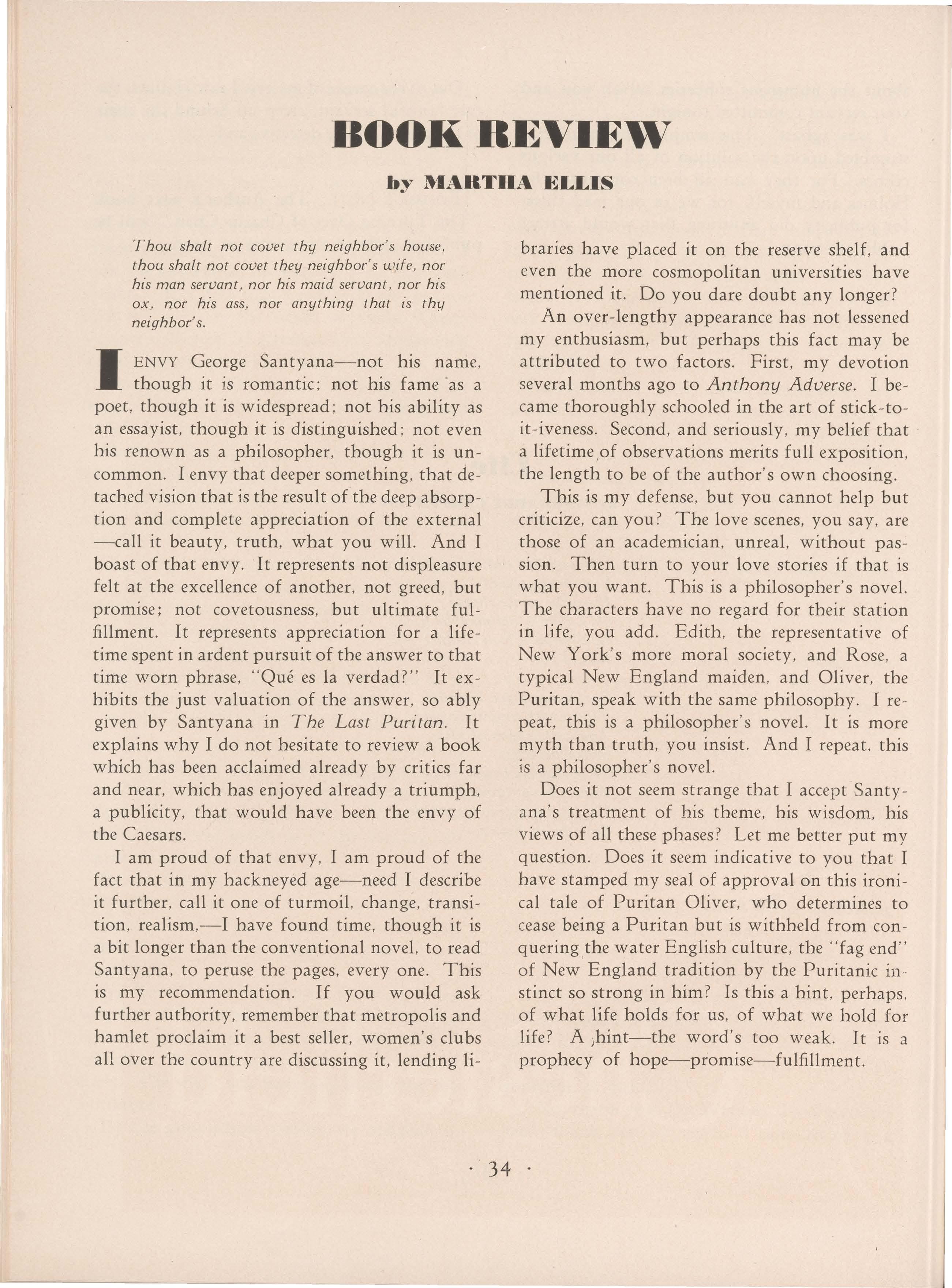
by MARTHA ELLIS
Thou shalt not cov et thy n eighbor ' s house , thou shalt not covet th ey neighbor ' s wif e, nor his man servant , nor his maid servant , nor his ox , nor his ass, nor anything that is thy n eighbor ' s.
IENVY George Santyana-not his name , though it is romantic ; not his fame ·as a poet , though it is widespread ; not his ability as an essayist, though it is distinguished ; not even his renown as a philosopher , though it is uncommon. I envy that deeper something, that detached vision that is the result of the deep absorption and complete appreciation of the external -call it beauty , truth , what you will. And I boast of that envy. It represents not displeasure felt at the excellence of another , not greed , but promise; not covetousness, but ultimate fulfillment . It represents appreciation for a lifetime spent in ardent pursuit of the answer to that time worn phrase , " Que es la verdad ? " It exhibits the just valuation of the answer , so ably given by Santyana in The Last Puritan . It explains why I do not hesitate to review a book which has been acclaimed already by critics far and near , which has enjoyed already a triumph , a publicity, that would have been the envy of the Caesars.
I am proud of that envy , I am proud of the fact that in my hackneyed age-need I describe it further , call it one of turmoil, change , transition , realism,-! have found time , though it is a bit longer than the conventional novel, to read Santyana , to peruse the pages , every one This is my recommendation. If you would ask further authority , remember that metropolis and hamlet proclaim it a best seller , women's clubs all over the country are discussing it, lending Ii-
braries have placed it on the reserve shelf , and even the more cosmopolitan universities have mentioned it Do you dare doubt any longer?
An over-lengthy appearance has not lessened my enthusiasm , but perhaps this fact may be attributed to two factors . First , my devotion several months ago to Anthony Adverse . I became thoroughly schooled in the art of stick-toit-iveness. Second , and seriously , my belief that a lifetime ,of observations merits full exposition , the length to be of the author ' s own choosing.
This is my defense, but you cannot help but criticize , can you ? The love scenes, you say , are those of an academician , unreal, without passion. Then turn to your love stories if that is what you want. This is a philosopher ' s novel. The characters have no regard for their station in life , you add. Edith , the representative of New York ' s more moral society , and Rose , a typical New England maiden , and Oliver, the Puritan , speak with the same philosophy I repeat , this is a philosopher ' s novel. It is more myth than truth , you insist. And I repeat, this is a philosopher ' s novel.
Does it not seem strange that I accep t Santyana ' s treatment of his theme, his wisdom , his views of all these phases? Let me better put my question. Does it seem indicative to you that I have stamped my seal of approval on this ironical tale of Puritan Oliver , who determines to cease being a Puritan but is withheld from conquering .the water English culture , the " fag end" of New England tradition by the Puritanic in stinct so strong in him? Is this a hint, perhaps , of what life holds for us , of what we hold for life? A ihint-the word ' s too weak . It 1s a prophecy of hope-promise-fulfillment

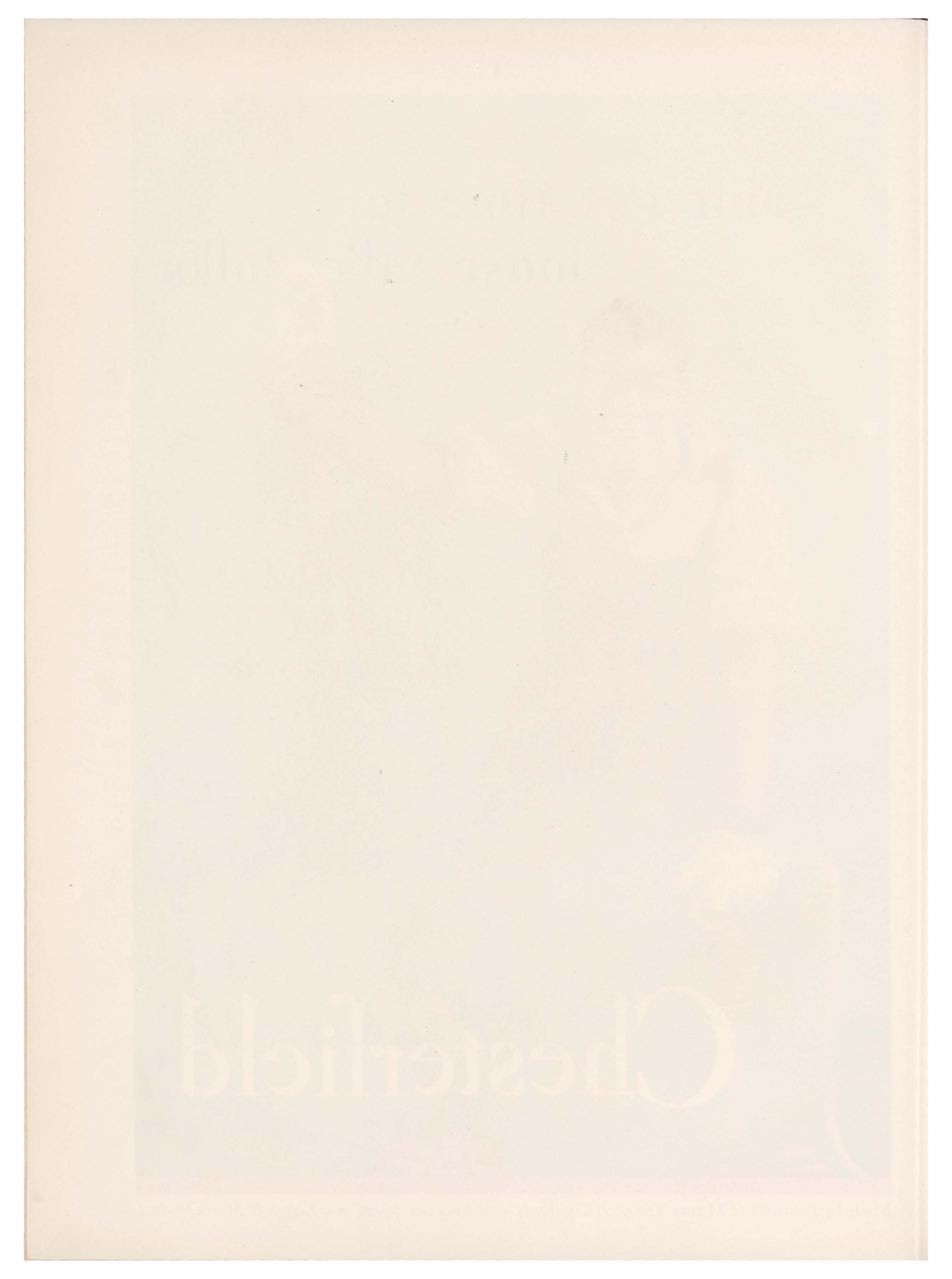
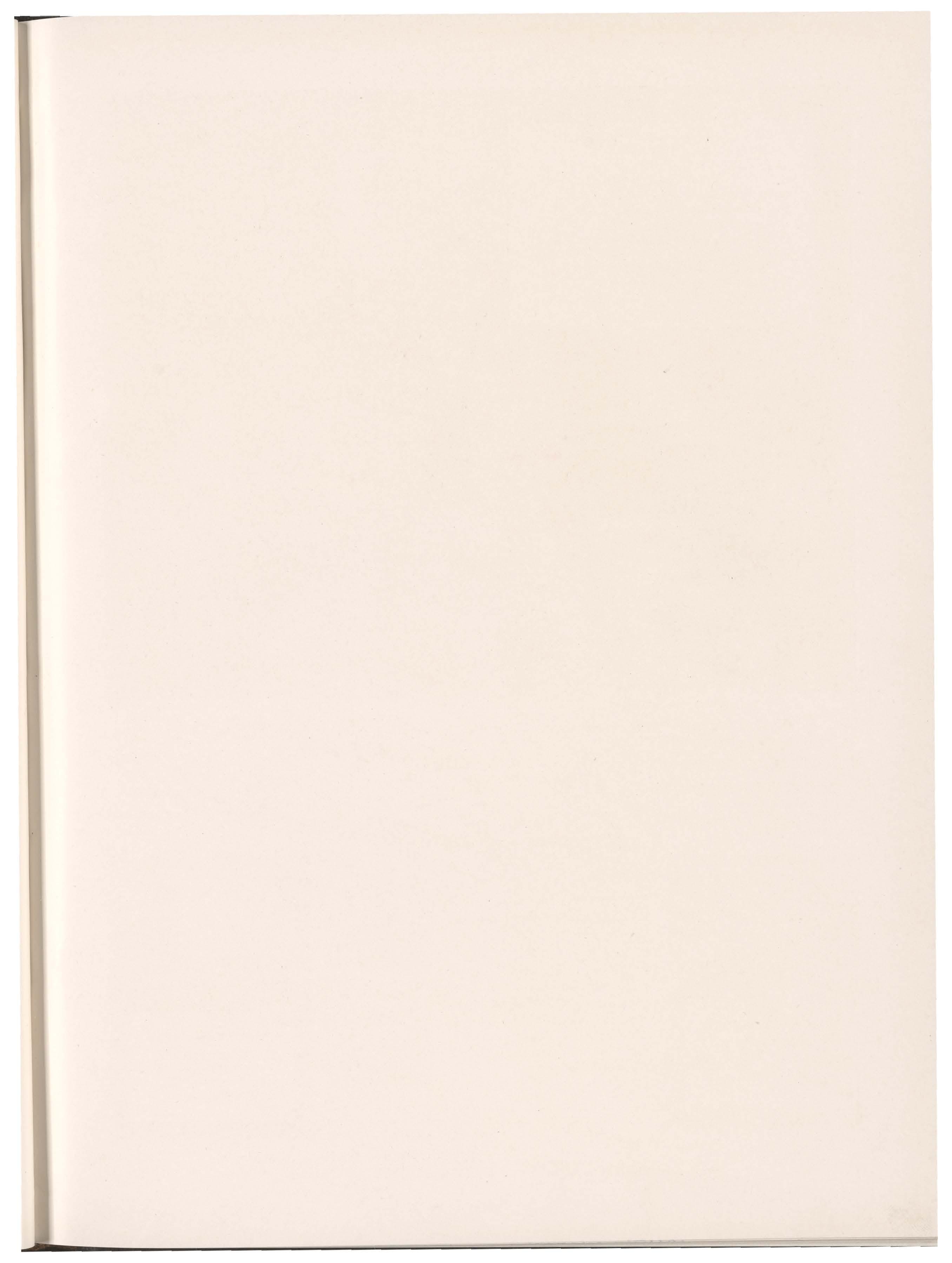
AFTER THE GREATEST FINISH under fire in golfing history, Tony Manero gets set for hearty eating by smoking Camels. He won the 1936 National Open with a spectacular 282. His digestion stands the strain of the long grind because, as Tony says: "I'll go on record any time -as one who thanks Camels for stimulating digestion. I feel cheered up while I'm eating-enjoy my food more-anJ have a feeling of ease afterward when I enjoy Camels along with my meals. Camels set me right."

WHETHER YOU ARE CATCHING A QUICK BITE OR DINING IN STATE-
CHAMPION BOWLER. Johnny Murphy says: "Smoking Camels at meals and after works out swell in my case!"
WITH healthy nerves and good digestion, you feel on top of the world. When you smoke Camels with your meals and after, tension is lessened. The flow of digestive fluids speeds up. And alkalinity is increased. For "lift" and "for digestion's sake," the answer is Camels. Camels set you right!
• Camels are made from liner, MORE EXPENSIVE TOBACCOS ••• Turkish and Domestic ..• than any other popular brand.